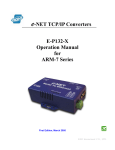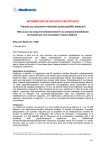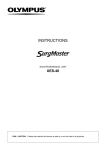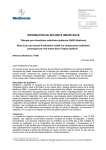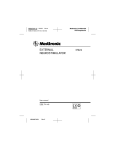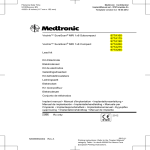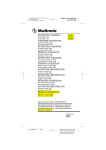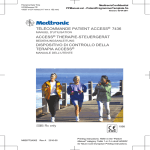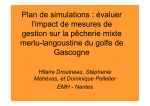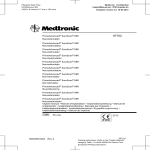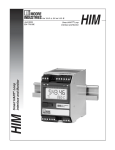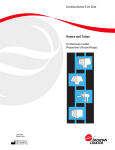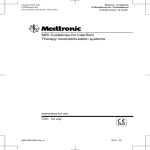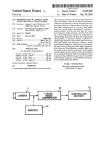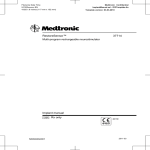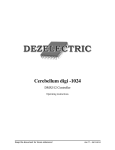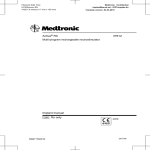Download SYNERGY™ SYNERGY VERSITREL™
Transcript
7427_V_fcv.fm 10/30/03 4:07 pm UC200xxxxxx EN 4.625 x 6 inches (117 mm x 152 mm) Medtronic Confidential package_R04 SYNERGY™ SYNERGY VERSITREL™ Dual-Program Neurostimulators for Spinal Cord Stimulation (SCS) Technical Manual Rx Only 221319002 Rev X 7427 7427V 7427_V_fcv.fm 10/30/03 4:07 pm UC200xxxxxx EN 4.625 x 6 inches (117 mm x 152 mm) 221319002 Rev X Medtronic Confidential package_R04 7427_V_ENtpg.fm 10/30/03 4:07 pm UC200xxxxxx EN 4.625 x 6 inches (117 mm x 152 mm) Medtronic Confidential package_R01 Synergy™ Model 7427 Synergy Versitrel™ Model 7427V Technical Manual 221319002 Rev X 7427_V_ENtpg.fm 10/30/03 4:07 pm UC200xxxxxx EN 4.625 x 6 inches (117 mm x 152 mm) Medtronic Confidential package_R01 The following are trademarks of Medtronic ® : DualScreen, Itrel, Mattrix, MemoryMod, N’Vision™, PiscesOctad, Pisces-Quad, Pisces-Quad Plus, Pisces Z Quad™, Pisces Z Quad Compact™, Pisces Z Quad Plus™, Resume TL, Resume II, Specify™, SoftStart™, Synergy™, Synergy Versitrel™, and X-trel. 221319002 Rev X 7427_V_ENTOC.fm 10/30/03 4:07 pm UC200xxxxxx EN 4.625 x 6 inches (117 mm x 152 mm) Medtronic Confidential package_R01 Table of Contents Introduction 5 Overview of Manual 5 Device Description 5 Package Contents 6 Patient Selection 7 Indications 7 Contraindications 7 Warnings 8 Precautions 11 Synergy and Synergy Versitrel Clinical Summary 16 Adverse Events 16 Neurostimulator Hardware Description 27 Identification 28 Power ON Reset 29 Battery Depletion 29 Neurostimulator Software Description 30 Programs 30 Programmable Functions 32 Lead-Extension Options 34 Screening Procedure 34 Synergy and Synergy Versitrel Systems Eligibility 35 Neurostimulator Implantation or Replacement 38 Neurostimulator Implantation 39 Neurostimulator Replacement 45 Explanted Component Disposal 51 Patient Counseling Information 51 Theft Detectors and Security Screening Devices 52 Patient Registration 53 3 221319002 Rev X 7427_V_ENTOC.fm 10/30/03 4:07 pm UC200xxxxxx EN 4.625 x 6 inches (117 mm x 152 mm) Medtronic Confidential package_R01 Resterilization 54 Specifications 56 Conformance to Standards 61 Appendix A: Battery Longevity Reference 62 Appendix B: Synergy EZ Patient Programmer 76 Keypad 77 Control Switches 78 Programmer Battery 79 Symbols and Indicator Lights 80 Patient Programmer Specifications 83 FCC Information 83 Special Notice 84 Warranty 85 Glossary 88 4 221319002 Rev X 7427_V_ENch.fm 10/30/03 4:07 pm UC200xxxxxx EN 4.625 x 6 inches (117 mm x 152 mm) Medtronic Confidential package_R01 Introduction Introduction Overview of Manual This manual describes specifications and operation of the Synergy Model 7427 and Synergy Versitrel Model 7427V Neurostimulators. It includes information about the control equipment used with each neurostimulator. You will find instructions for handling, storing, implanting, replacing, and explanting the neurostimulator. General resterilization guidelines are also provided for the neurostimulator. In addition, this manual describes some items to discuss with your patient. Device Description The Medtronic Synergy Model 7427 and Synergy Versitrel Model 7427V Neurostimulators are multiprogrammable devices designed for use in spinal cord stimulation. They accommodate one or two extensions and can function in either dual-program mode or singleprogram mode. In dual-program mode, the amplitude, pulse width and up to 8 electrodes are set independently for each program. In single-program mode, the amplitude, pulse width, and rate are delivered to the selected electrodes; up to 8 electrodes can be selected. The operation of the neurostimulator is supported by a clinician programmer and patient programmer. The neurostimulator is powered by a sealed battery and directed by electronic circuitry to send pulses of controlled electrical stimulation through the implanted lead-extensions to target sites. For a complete list of model numbers and components compatible with the neurostimulator, see the system components sheet packaged with this manual in the neurostimulator shelf box. 5 221319002 Rev X 7427_V_ENch.fm 10/30/03 4:07 pm UC200xxxxxx EN 4.625 x 6 inches (117 mm x 152 mm) Medtronic Confidential package_R01 Introduction Synergy Model 7427 Synergy Versitrel Model 7427V Figure 1. Synergy Model 7427 and Synergy Versitrel Model 7427V Neurostimulators. Notes: ■ Throughout this manual, the Model 7427 Neurostimulator is typically depicted within figure art. ■ The functionality of the Synergy Versitrel and Synergy Neurostimulators is identical; however, the longevity of the Synergy Neurostimulator is longer than that of the Synergy Versitrel Neurostimulator. Refer to Table 10 on page 60 in “Specifications” for an overview of physical differences between the two models. Figure 1 is a comparison of the size and shape of the Synergy and Synergy Versitrel Neurostimulators. Package Contents ■ One Synergy Model 7427 or one Synergy Versitrel Model 7427V Neurostimulator ■ One hex wrench ■ Product literature 6 221319002 Rev X 7427_V_ENch.fm 10/30/03 4:07 pm UC200xxxxxx EN 4.625 x 6 inches (117 mm x 152 mm) Medtronic Confidential package_R01 Patient Selection Patient Selection The Synergy and Synergy Versitrel Neurostimulation Systems are designed to aid in the management of pain via pulsed electrical stimulation through nerve structures in the dorsal aspect of the spinal cord. Activation of these structures produces nerve impulses that can inhibit the transmission of pain. Indications The Synergy Model 7427 and Synergy Versitrel Model 7427V Neurostimulators are part of dual-program systems for spinal cord stimulation. The systems are indicated as an aid in the management of chronic, intractable pain of the trunk or limbs. Patients should be carefully selected to assure that their pain is of physiological origin. Also, patients must be appropriate candidates for surgery. Contraindications Patients are contraindicated for internalization if they are clearly unsuccessful in receiving pain relief during trial stimulation, or if they are unable to properly operate the system. After implantation of any system component, the following contraindication applies: Diathermy – Do not use shortwave diathermy, microwave diathermy or therapeutic ultrasound diathermy (all now referred to as diathermy) on patients implanted with a neurostimulation system. Energy from diathermy can be transferred through the implanted system and can cause tissue damage at the location of the implanted electrodes, resulting in severe injury or death. Diathermy is further prohibited because it can also damage the neurostimulation system components resulting in loss of therapy, requiring additional surgery for system explantation and replacement. Injury or damage can occur during diathermy treatment 7 221319002 Rev X 7427_V_ENch.fm 10/30/03 4:07 pm UC200xxxxxx EN 4.625 x 6 inches (117 mm x 152 mm) Medtronic Confidential package_R01 Warnings whether the neurostimulation system is turned “on” or “off.” Advise your patients to inform all their health care professionals that they should not be exposed to diathermy treatment. Warnings Case Damage – If the neurostimulator case is ruptured or pierced due to outside forces, severe burns could result from exposure to the battery chemicals. Electrocautery – In certain circumstances, electrocautery can cause the neurostimulator to stop functioning which will require the neurostimulator to be replaced. It could also change the programmed parameters to “Power ON Reset” settings which include changing the output to “off” and the amplitude to zero which would require the neurostimulator to be reprogrammed with the Medtronic clinician programmer. Based on tests to date, if use of electrocautery is necessary, follow these precautions: ■ Turn off the neurostimulator before performing electrocautery. ■ Only bipolar cautery is recommended. ■ If unipolar cautery is necessary: Do not use high voltage modes; keep the power setting as low as possible, and keep the current path (ground plate) as far away from the neurostimulator, extension, and lead as possible. ■ Confirm the neurostimulator function after electrocauterization. The effect of electrocautery on patients with implanted neurostimulators is unknown. Equipment Operation – Patients should not operate potentially dangerous equipment such as power tools or automobiles during stimulation. 8 221319002 Rev X 7427_V_ENch.fm 10/30/03 4:07 pm UC200xxxxxx EN 4.625 x 6 inches (117 mm x 152 mm) Medtronic Confidential package_R01 Warnings Magnetic Resonance Imaging (MRI) – Medtronic recommends physicians not prescribe an MRI for a patient who has any component of an implanted neurostimulation system for Spinal Cord Stimulation (SCS). Exposing a patient with an implanted SCS neurostimulation system to an MRI may potentially injure the patient and/or damage the neurostimulator. The known potential risks are as follows: ■ Induced electrical currents from the MRI to the neurostimulation system may cause heating, especially at the lead electrode site, resulting in tissue damage. Induced electrical currents may also stimulate or shock the patient. Note: This warning applies even if only a lead and/or extension is implanted in the body. Heating risks are affected by a number of factors involving the MRI equipment and the implanted neurostimulation system. Factors that increase the risks of heating and patient injury include but are not limited to the following: – High MRI Specific Absorption Rate (SAR) Radio Frequency (RF) power levels – Lower impedance leads and/or extensions (Medtronic product names or model numbers designated with a “Z”, an “LZ”, or “Low Impedance”) – MRI RF transmit coil that is near or extends over the implanted lead system – Implanted lead systems with small surface area electrodes – Short separation distances between lead electrodes and thermally sensitive tissue ■ An MRI may permanently damage the neurostimulator, which may require explant or possible replacement. ■ An MRI may affect the functional operation of the neurostimulator. The MRI may also reset the neurostimulator parameters to its default settings, which requires reprogramming with the clinician programmer. 9 221319002 Rev X 7427_V_ENch.fm 10/30/03 4:07 pm UC200xxxxxx EN 4.625 x 6 inches (117 mm x 152 mm) Medtronic Confidential package_R01 Warnings ■ The neurostimulator may move within the implant pocket and align itself with the MRI field, which may cause patient discomfort or open a recent neurostimulator implant incision. In addition, the MRI image details may be degraded, distorted, or blocked from view by the implanted neurostimulation system. Pediatric Use – Safety and effectiveness of this system has not been established for pediatric use. Postural Changes – Postural changes or abrupt movements may cause an increase or decrease in the perceived level of stimulation. Higher levels of stimulation have been described as uncomfortable (“jolting” or “shocking”) by some patients. Pregnancy – Safety for use during pregnancy or delivery have not been established. Telemetry – Do not send a patient home with “????” displayed on the clinician programmer screen for any programmable value. This indicates that the parameter or mode is invalid and must be reprogrammed. Theft Detectors and Screening Devices – Theft detectors found in retail stores, public libraries, etc., and security screening devices found in airports, government buildings, etc., occasionally may cause intermittent stimulation or a momentary increase in stimulation intensity. When they pass through these devices, some patients may perceive intermittent stimulation as switching their neurostimulation system on and off. It is also possible that patients, especially those with low stimulation thresholds, may experience a momentary increase in their perceived stimulation when they pass through these devices. Higher levels of stimulation have been described as uncomfortable (“jolting” or “shocking”) by some patients. For information on how to minimize these interactions when passing through theft detectors and security screening devices, see “Patient Counseling Information” on page 51. 10 221319002 Rev X 7427_V_ENch.fm 10/30/03 4:07 pm UC200xxxxxx EN 4.625 x 6 inches (117 mm x 152 mm) Medtronic Confidential package_R01 Precautions Precautions Physician Training Implanting Physicians – Implanting physicians should be experienced in spinal procedures and review the procedures described in this technical manual prior to implant. Prescribing Physicians – Prescribing physicians should be experienced in the diagnosis and treatment of chronic intractable pain of the trunk or limbs and should be familiar with the use of the Synergy and Synergy Versitrel Neurostimulation Systems. Storage and Sterilization Resterilization Considerations – All implantable components are supplied sterile. If resterilization is necessary, refer to “Resterilization” on page 54 for further information. Sterilization Method – The neurostimulator was sterilized with ethylene oxide before shipment. Storage Temperature – Store the neurostimulator between 0° F (-18° C) and 125° F (52° C). Temperatures outside this range can damage components. System and Therapy Component Failures – The physician should be aware that all neurostimulation systems may unexpectedly cease to function. A system may fail at any time due to random failures of the system components or the battery (prior to depletion). These events, which can include electrical short or open circuits and insulation breaches, cannot be predicted. Components – The use of non-Medtronic components with this system may result in damage to Medtronic components, less than adequate stimulation, or increased risks to the patient. 11 221319002 Rev X 7427_V_ENch.fm 10/30/03 4:07 pm UC200xxxxxx EN 4.625 x 6 inches (117 mm x 152 mm) Medtronic Confidential package_R01 Precautions Patient Detoxification – It is recommended that patients undergo detoxification from narcotics prior to implant. Patient Management – To help ensure maximum benefits from the neurostimulation system, long-term postsurgical management of patients is recommended. Implantation / Explantation Component Disposal – If explanting a Synergy or Synergy Versitrel Neurostimulation System component, please remember the following guidelines: ■ Do not incinerate the neurostimulator; explosion can result if a neurostimulator is subjected to incineration or cremation temperatures. ■ Return all explanted components to Medtronic for analysis and safe disposal. Component Handling – Handle the implanted components of this system with extreme care. These components may be damaged by excessive traction or sharp instruments. Etched Identification – Place the neurostimulator with the etched identification side facing outward, away from the muscle layer of the body. Extension-Neurostimulator Connection – Wipe off any body fluids from the extension connector pins or connector block before connecting them. Contamination of connections can affect neurostimulation. Do not tighten setscrews without the extension inserted. This can damage the connector block. Do not insert an extension into the neurostimulator connector block without visual verification that the setscrews are sufficiently retracted to allow insertion. Implant Considerations – Do not implant a device when the storage package has been pierced or altered, potentially rendering it non-sterile; the component shows signs of damage; or the Use By 12 221319002 Rev X 7427_V_ENch.fm 10/30/03 4:07 pm UC200xxxxxx EN 4.625 x 6 inches (117 mm x 152 mm) Medtronic Confidential package_R01 Precautions date has expired, because this can adversely affect storage package sterility and battery longevity. Neurostimulator Handling – Be extremely careful when using sharp instruments around the neurostimulator to avoid nicking or damaging the neurostimulator case or the connector block. The neurostimulator can be damaged if dropped from a height of 12 inches (30 cm) or more onto a hard surface (i.e., a concrete floor). If this happens, do not implant the neurostimulator. Lead-Extension Connection – Wipe off any body fluids from the lead or extension contacts before connecting. Contamination of connections can affect neurostimulation. Lead-Extension Routing – It is recommended that the implanted lead-extensions in dual lead-extension systems be routed so they do not form a “loop.” When exposed to some theft detectors, looped lead-extensions increase the potential for patients to experience a momentary increase in their perceived level of stimulation. Higher levels of stimulation have been described as uncomfortable (“jolting” or “shocking”) by some patients as they pass through these devices. Figure 2 illustrates proper and improper routing methods for dual lead-extensions. Proper Improper Figure 2. Proper and improper dual lead-extension routing (use fluoroscopy to verify). 13 221319002 Rev X 7427_V_ENch.fm 10/30/03 4:07 pm UC200xxxxxx EN 4.625 x 6 inches (117 mm x 152 mm) Medtronic Confidential package_R01 Precautions Single Use – The neurostimulator is intended for Single Use Only. DO NOT REUSE. Medical Environment Most routine diagnostic procedures, such as fluoroscopy and x-rays, are not expected to affect system operation. However, the following precautions should be noted. Effects on Other Medical Devices – The neurostimulation system may affect the operation of other implanted devices, such as cardiac pacemakers and implantable defibrillators. Possible effects include sensing problems and inappropriate device responses. If the patient requires concurrent implantable pacemaker and/or defibrillator therapy, careful programming of each system may be necessary to optimize the patient’s benefit from each device. External Defibrillators – Safety for use of external defibrillatory discharges on patients with neurostimulation systems has not been established. External defibrillation may damage a neurostimulator. If external defibrillation is necessary, follow these precautions to minimize current flowing through the neurostimulator and leadextension system: ■ Position defibrillation paddles as far from the neurostimulator as possible. ■ Position defibrillation paddles perpendicular to the neurostimulation system. ■ Use the lowest clinically appropriate energy output (watt seconds). ■ Confirm neurostimulation system function following any external defibrillation. Lithotripsy – Use of high output ultrasonic devices, such as an electrohydraulic lithotriptor, is not recommended for patients with an implanted neurostimulation system. While there is no danger to the patient, exposure to high output ultrasonic frequencies may result in 14 221319002 Rev X 7427_V_ENch.fm 10/30/03 4:07 pm UC200xxxxxx EN 4.625 x 6 inches (117 mm x 152 mm) Medtronic Confidential package_R01 Precautions damage to the neurostimulator circuitry. If lithotripsy must be used, do not focus the beam near the neurostimulator. Radiation Therapy – Radiation therapy can cause damage to the electronic components of a neurostimulator. It is not recommended to use radiation therapy directly over a neurostimulation device. Home or Occupational Environment Cellular Phones – Based on tests to date, cellular phones appear to have no effect on the Synergy and Synergy Versitrel Neurostimulation Systems. However, the effect of all cellular phones on neurostimulation systems is unknown and patients should avoid placing cellular phones directly over the device. Electromagnetic Interference – Patients should exercise reasonable caution in avoidance of devices which generate a strong electric or magnetic field. Close proximity to high levels of electromagnetic interference (EMI) may cause a neurostimulator to unexpectedly cease to function or cause sensitive patients to experience a momentary increase in their perceived level of stimulation. Also, severe EMI can permanently erase the neurostimulator serial number, causing “????” to be displayed in place of the serial number. High/Low Pressure Effects – The effects of high/low pressure on patients with an implanted neurostimulation system are unknown. Home Appliances – Home appliances that are in good working order and properly grounded do not usually produce enough electromagnetic interference (EMI) to interfere with neurostimulator operation. Occupational Environments – Commercial electrical equipment (arc welders, induction furnaces, resistance welders), communication equipment (microwave transmitters, linear power amplifiers, high-power amateur transmitters), and high voltage power lines may generate enough EMI to interfere with neurostimulator operation if approached too closely. 15 221319002 Rev X 7427_V_ENch.fm 10/30/03 4:07 pm UC200xxxxxx EN 4.625 x 6 inches (117 mm x 152 mm) Medtronic Confidential package_R01 Synergy and Synergy Versitrel Clinical Summary Synergy and Synergy Versitrel Clinical Summary The clinical use of Synergy and Synergy Versitrel Neurostimulation Systems is supported by Medtronic clinical studies of the Mattrix and Itrel 3 Spinal Cord Stimulation Systems. All patients were implanted to aid in the management of chronic, intractable pain of the trunk or limbs. Following is a summary of the data from those studies that supports the clinical use of Synergy and Synergy Versitrel Systems. The Medtronic-sponsored Mattrix study was a retrospective evaluation of 89 patients. All patients implanted with dual-program radio frequency Mattrix Systems before April 1996 at the four participating centers were included in the study, which allowed each patient to be followed for at least 12 months. A total of 1,261 device months of experience were acquired for this study. The Medtronic-sponsored Itrel 3 study was a prospective, open label evaluation of 84 patients implanted at 11 centers. A total of 823 device months of experience were acquired for this study. Combined adverse event data for these two studies represents a total of 2,084 device months of experience collected from 173 patients. The adverse event experience reported here represents this combined experience. Adverse Events Eighty-three of the 173 patients experienced 116 device-related and nondevice-related adverse events. Eighty-seven of the adverse events in 65 patients were considered to be device related. Devicerelated adverse events reported in at least 2 patients each are provided in Table 1. 16 221319002 Rev X 7427_V_ENch.fm 10/30/03 4:07 pm UC200xxxxxx EN 4.625 x 6 inches (117 mm x 152 mm) Medtronic Confidential package_R01 Synergy and Synergy Versitrel Clinical Summary Table 1. Mattrix and Itrel 3 Study Combined Device-Related Adverse Events Experienced By At Least Two Patients Eacha. Adverse Event Number of Patients Reporting Loss of Pain Relief 22 Lead Migration 16 Infection 8 Pain at Pocket Site 5 Receiver Migrationb Antenna Placement a b 4 Problemb 4 Programmer/Telemetry Problem 3 Transmitter Malfunctionb 2 Threshold Rise 2 Patients may have experienced more than one event. These device-related adverse events are applicable only to the radio frequency Mattrix System and are not applicable to a fully implantable system. Other device-related adverse events experienced in 1 patient each included receiver malfunction, seroma at receiver site, allergic/ immune response, undesirable change in stimulation, “pain relief no better than single lead stimulation/stimulation drives patients pain,” CSF leak, pocket hypersensitivity, loss of electronic serial number and Power ON Reset condition after MRI, electrode failure, lead erosion, radicular chest wall stimulation, high electrode impedance due to lead fracture, suspected lead breakage, and lead/extension infection. 17 221319002 Rev X 7427_V_ENch.fm 10/30/03 4:07 pm UC200xxxxxx EN 4.625 x 6 inches (117 mm x 152 mm) Medtronic Confidential package_R01 Synergy and Synergy Versitrel Clinical Summary Potential Adverse Events Anticipated adverse events which may potentially occur, but were not reported in the referenced clinical trials, include: ■ Neurostimulator erosion ■ Extension erosion/migration ■ Patients on anticoagulant therapies may be at greater risk for postoperative complications such as hematomas that can result in paralysis ■ Placement of the epidural lead-extension is a surgical procedure that may expose patient to risks of epidural hemorrhage, hematoma, and/or paralysis ■ Hematoma at the neurostimulator site ■ Undesirable change in stimulation, possibly related to cellular changes around the electrode(s), shifts in electrode position, loose electrical connections, or lead-extension fractures, which has been described as uncomfortable (“jolting” or “shocking”) by some patients Stimulation Parameter Use Stimulation parameters used during the Itrel 3 study are provided in Table 2. 18 221319002 Rev X Medtronic Confidential package_R01 7427_V_ENch.fm 10/30/03 4:07 pm UC200xxxxxx EN 4.625 x 6 inches (117 mm x 152 mm) Synergy and Synergy Versitrel Clinical Summary Table 2. Summary of Itrel 3 Study Stimulation Parameters. Stimulation Parameter 1 Month (82 systems) 3 Months (78 systems) 6 Months (69 systems) 12 Months (63 systems) Amplitude (V) Average Standard Deviation n 3.2 1.6 79 3.2 1.8 73 3.1 1.7 61 3.0 1.8 58 Pulse Width (µsec) Average Standard Deviation n 275 76 81 283 82 78 280 88 66 278 81 64 Pulse Rate (Hz) Average Standard Deviation n 79 25 81 79 24 78 81 25 67 85 32 64 Mattrix Study Design The Mattrix 12-Month Study was a retrospective review of 12 months of implant and follow-up experience from a consecutive series of U.S. patients with Mattrix systems. All patients were implanted to aid in the management of chronic, intractable pain of the trunk or limbs. Mattrix Patients Studied Four investigational sites in the United States participated in this study. A total of 89 patients were enrolled in the study at these four sites. Fifty-two percent (46/89, 52%) of study patients were male. The mean age of study patients was 51 years (range: 29 – 84 years). Mattrix Study Methods This study was a retrospective review of at least 12 months of implant and follow-up experience from a consecutive series of U.S. patients with Mattrix systems. Most data was collected retrospectively from clinic records of the last follow-up for patients with at least 12 months of Mattrix follow-up experience. Data was gathered prospectively for patients who had less than 12 months of Mattrix follow-up data in clinic records. 19 221319002 Rev X 7427_V_ENch.fm 10/30/03 4:07 pm UC200xxxxxx EN 4.625 x 6 inches (117 mm x 152 mm) Medtronic Confidential package_R01 Synergy and Synergy Versitrel Clinical Summary Mattrix Study Results Average follow-up per patient was 14.2 ± 4.5 months, with a range of 2.3 – 22.9 months. At least one year of follow-up was obtained for 82% (73/89) of the study patients. Proper device operation was reported by physicians for 93% of patients (83/89). Sixty-nine patients (69/89, 78%) were using their Mattrix devices at their last known follow-up. Of the 73 patients who had at least one year follow-up completed, 64 patients (64/73, 88%) were using their Mattrix devices at their last known follow-up. There were 14 system explants (10 device related), 4 patients for whom therapy was discontinued but no explant occurred (3 device related), and one patient death (not related to the device). Use information was not available for one patient. A system survival curve is presented in Figure 3 that examines the impact of these 13 devicerelated events on device use throughout the clinical study follow-up period. This standard Kaplan Meier survival curve with a 95% confidence limit presents the time to system not in use for devicerelated adverse events only. This graph indicates 88.3% (plus or minus 3.5%) of patients had devices in use at approximately 1 year of follow-up, where 3.5% represents the 95% confidence limit. At 1.5 years, this number drops to about 83.9%. The system survival curve presented in Figure 4 examines the impact of all adverse events on device use throughout the clinical study follow-up period. This standard Kaplan Meier survival curve with a 95% confidence limit presents the time to system not in use for all adverse events. This graph indicates 82.6% (plus or minus 4.1%) of patients had devices in use at approximately 1 year of follow-up. At 1.5 years, this number drops to about 78.4%. 20 221319002 Rev X Medtronic Confidential package_R01 7427_V_ENch.fm 10/30/03 4:07 pm UC200xxxxxx EN 4.625 x 6 inches (117 mm x 152 mm) Synergy and Synergy Versitrel Clinical Summary Survival Probability Device-in-Use Kaplan Meier Survival Curve with 95% Confidence Limits Mattrix Retrospective Study—Device-Related Events Only One-year survival estimate = 88.3 ± 3.5% Time Until Not in Use (Days) Figure 3. Device-in-use survival curve for device-related events. 21 221319002 Rev X Medtronic Confidential package_R01 7427_V_ENch.fm 10/30/03 4:07 pm UC200xxxxxx EN 4.625 x 6 inches (117 mm x 152 mm) Synergy and Synergy Versitrel Clinical Summary Device-in-Use Kaplan Meier Survival Curve with 95% Confidence Limits Mattrix Retrospective Study—All Reported Adverse Events Survival Probability One-year survival estimate = 82.6 ± 4.1% Time Until Not in Use (Days) Figure 4. Device-in-use survival curve for all adverse events. Patient satisfaction with the pain relief provided by the stimulation system after one year of use was determined by asking the following question: “Is the patient satisfied with the pain relief provided by the Mattrix System?” Responses to patient satisfaction are summarized in Table 3. Investigators indicated that 62% of all study patients (55/89) were satisfied with pain relief. Of the 73 patients completing one year of follow-up, this satisfaction with pain relief rose to 70% (51/73 patients). “Other” responses to this satisfaction question included: “patient would not commit” (3), partial pain relief (2), pain controlled until patient fell (1), inadequate relief (1), skin irritation (1), complication before fully optimized (1), and system explanted (1). 22 221319002 Rev X Medtronic Confidential package_R01 7427_V_ENch.fm 10/30/03 4:07 pm UC200xxxxxx EN 4.625 x 6 inches (117 mm x 152 mm) Synergy and Synergy Versitrel Clinical Summary Table 3. Investigator Evaluation of Patient Satisfaction. Patient Group Patient Satisfied n(%) Patient Missing Not Satisfied Responses n(%) n(%) Other Responses n(%) Patient with ≥ 12 month follow-up (n=73) 51 (70%) 14 (19%) 0 (0%) 8 (11%) All patients (n=89) 55 (62%) 22 (25%) 2 (2%) 10 (11%) Forty-nine of the 89 patients experienced a total of 75 device-related and nondevice-related adverse events. A total of 65 of these adverse events were considered to be device related. There were no unanticipated adverse device events reported. Device-related adverse events reported by at least 2 patients each in this study are presented in Table 4. 23 221319002 Rev X Medtronic Confidential package_R01 7427_V_ENch.fm 10/30/03 4:07 pm UC200xxxxxx EN 4.625 x 6 inches (117 mm x 152 mm) Synergy and Synergy Versitrel Clinical Summary Table 4. Mattrix Study Device-Related Adverse Events Experienced By At Least Two Patients Each. Adverse Event Loss of Pain Relief 21 Lead Migration 12 Infection (Receiver Site) 5 Migrationa 4 Antenna Placement Problema 4 Pain at Receiver Site 3 Receiver Transmitter Malfunctiona Pain at Pocket Site a Number of Patients Reporting 2 2 These device-related adverse events are applicable only to the radio frequency Mattrix System and are not applicable to a fully implantable system. Other device-related adverse events experienced in 1 patient each (1%) included receiver malfunction, seroma at receiver site, allergic/ immune response, undesirable change in stimulation, pain relief no better than single lead stimulation/stimulation drives patients pain, and CSF leak. Itrel 3 Study Design The Itrel 3 study was a prospective, open-label study of 84 spinal cord stimulation patients followed for 1, 3, 6, and 12 months. All patients were implanted to aid in the management of chronic, intractable pain of the trunk or limbs. Itrel 3 Patients Studied A total of 11 centers throughout Europe participated in this study, enrolling 84 patients. One patient received two Itrel 3 systems; 24 221319002 Rev X 7427_V_ENch.fm 10/30/03 4:07 pm UC200xxxxxx EN 4.625 x 6 inches (117 mm x 152 mm) Medtronic Confidential package_R01 Synergy and Synergy Versitrel Clinical Summary therefore, 85 systems were evaluated. Fifty-four percent (45/84, 54%) of the study patients were male. Average age at study enrollment was 52.6 years (range: 22 – 86 years). Itrel 3 Study Methods Data was prospectively collected in this study for a set of 84 European patients. Follow-up visits were scheduled at 1, 3, 6, and 12 months. Safety data collected in the study included adverse event experiences and reasons for study discontinuation. Itrel 3 Study Results Average daily duration of pain was significantly reduced (p<0.0001) at each follow-up interval when compared to the duration at baseline. Patients reported an average of at least 63% pain relief throughout the follow-up evaluation. Of the 62 patients completing 12-month follow-up, 97% (60/62, 97%) indicated stimulation was beneficial and 95% (59/62, 95%) indicated they would agree to stimulation again for the same benefits. A total of 34 patients experienced 41 device-related and nondevicerelated adverse events. Twenty-two of the adverse events in 21 patients were considered to be device related. There were no unanticipated adverse device events reported. Device-related adverse events reported in at least 2 patients each are provided in Table 5. 25 221319002 Rev X Medtronic Confidential package_R01 7427_V_ENch.fm 10/30/03 4:07 pm UC200xxxxxx EN 4.625 x 6 inches (117 mm x 152 mm) Synergy and Synergy Versitrel Clinical Summary Table 5. Itrel 3 Study Device-Related Adverse Events Experienced By At Least Two Patients Each. a Adverse Event Number of Patients Reporting Lead Migrationa 4 Infection 3 Programmer/Telemetry Problem 3 Threshold Rise 2 One patient reported two lead migrations. Other device-related adverse events experienced in one patient each included pocket hypersensitivity, loss of electronic serial number and Power ON Reset condition after MRI, electrode failure, loss of pain relief, lead erosion, radicular chest wall stimulation, high electrode impedance due to lead fracture, suspected lead breakage, and lead/ extension infection. Individualization of Treatment Best results are achieved when the patient is fully informed about the therapy risks and benefits, surgical procedure, follow-up requirements, and self-care responsibilities. Implantation of the Synergy or Synergy Versitrel Neurostimulation System may be appropriate for patients who meet the following criteria: ■ Patients should have chronic, intractable pain of physiological origin. ■ Patients should be appropriate candidates for surgery. Before the Synergy or Synergy Versitrel Neurostimulation System is implanted, the following conditions should be met: ■ Satisfactory paresthesia coverage should be demonstrated by: – intraoperative screening, or – pre-existing spinal cord stimulation system. 26 221319002 Rev X 7427_V_ENch.fm 10/30/03 4:07 pm UC200xxxxxx EN 4.625 x 6 inches (117 mm x 152 mm) Medtronic Confidential package_R01 Neurostimulator Hardware Description ■ Ensure that satisfactory paresthesia coverage can be obtained for patients within the parameter limits of the Synergy or Synergy Versitrel device. Refer to Table 7 on page 38 for a summary of maximum stimulation voltage available from the Synergy or Synergy Versitrel device given set values for pulse width and rate. – If the pulse rate is greater than 130 Hz, trial stimulation should be repeated using a pulse rate of 130 Hz or lower. – If the pulse width is greater than 450 µsec, trial stimulation should be repeated using a pulse width of 450 µsec and increasing the pulse amplitude by 5-10%. – If both pulse rate and pulse width are within the parameter capabilities of Synergy or Synergy Versitrel, but the trial stimulation amplitude is greater than the corresponding amplitude shown in Table 7, trial stimulation should be repeated using a lower pulse rate to achieve the necessary amplitude. If this cannot be accomplished, the high-energy use patient should be evaluated for treatment with a Mattrix System. ■ Ensure that unipolar mode stimulation is not required to obtain satisfactory paresthesia coverage (unipolar mode stimulation is not available with the Synergy or Synergy Versitrel Neurostimulation Systems). Neurostimulator Hardware Description The neurostimulator is powered by a hermetically sealed silver vanadium oxide cell and uses an integrated circuit to generate electrical stimulation pulses. To protect the neurostimulator components from body fluids, the electronics and power source are hermetically sealed within an oval-shaped titanium shield. 27 221319002 Rev X 7427_V_ENch.fm 10/30/03 4:07 pm UC200xxxxxx EN 4.625 x 6 inches (117 mm x 152 mm) Medtronic Confidential package_R01 Neurostimulator Hardware Description The neurostimulator has a self-sealing connector block and four setscrews. The connector block accommodates one or two extensions to form a dual-program system. Securing the extensions to the neurostimulator requires the use of a hex wrench that is packaged with the neurostimulator. Other features of the neurostimulator include: two suture holes to enable you to secure the neurostimulator within the subcutaneous pocket; Power ON Reset (POR); and an x-ray identification symbol. Identification Standard x-rays show the Medtronic logo and NFE inside the connector block. The Medtronic logo identifies the manufacturer. The letters NFE identify both the Synergy Model 7427 and Synergy Versitrel Model 7427V Neurostimulators (see Figure 5). The clinician programmer identifies both neurostimulators as a Model 7427 because both Synergy Model 7427 and Synergy Versitrel Model 7427V offer the same features and same programmability. If necessary, there are several ways to distinguish the Model 7427 from the Model 7427V: ■ The clinician programmer displays the neurostimulator serial number. Synergy Model 7427 serial numbers begin with NFE followed by a number beginning with 1, 2, 3, or 6. Synergy Versitrel Model 7427V serial numbers begin with NFE followed by a number beginning with 4, 5, 7, or 9. Should Power ON Reset occur and erase the serial number, standard x-ray procedures or palpation may be used to identify the neurostimulator. Loss of the serial number does not impact the ability to correctly program the Synergy or Synergy Versitrel Neurostimulator. ■ Standard x-ray procedures and palpation allow identification of the neurostimulator. The Synergy Neurostimulator is approximately 3 inches long and 2.4 inches wide. The Synergy 28 221319002 Rev X 7427_V_ENch.fm 10/30/03 4:07 pm UC200xxxxxx EN 4.625 x 6 inches (117 mm x 152 mm) Medtronic Confidential package_R01 Neurostimulator Hardware Description Versitrel Neurostimulator is approximately 2.4 inches long and 2.4 inches wide. See Figure 1 on page 6. Neurostimulator Connector Block N F E Figure 5. X-ray identification location. Power ON Reset As a safety feature, if there is a temporary fluctuation in battery output, the neurostimulator programmed settings and serial number will be lost and reprogramming will be necessary. This is called Power ON Reset (POR) and may be caused by strong electromagnetic interference such as use of an electrocautery tip near the neurostimulator or defibrillation. POR also occurs as the neurostimulator battery nears depletion. Battery Depletion As the neurostimulator battery nears total depletion (as indicated by the blinking green light on the patient programmer) stimulation will gradually decrease and then vanish completely when the neurostimulator automatically shuts off. Refer to “Appendix A: Battery Longevity Reference” on page 62 to estimate neurostimulator battery life. Caution: Patients should be instructed that as their neurostimulator battery approaches total depletion, they may need to adjust the 29 221319002 Rev X 7427_V_ENch.fm 10/30/03 4:07 pm UC200xxxxxx EN 4.625 x 6 inches (117 mm x 152 mm) Medtronic Confidential package_R01 Neurostimulator Software Description neurostimulator amplitude more often to maintain their desired level of stimulation. Neurostimulator Software Description Models 7427 and 7427V Neurostimulators have a wide range of noninvasively programmable parameters and stimulation modes. The neurostimulators are part of a dual-program system and offer dual-program and single-program modes. Programs The stimulation pulses delivered are determined by a program. A program is a specific combination of amplitude, rate, and pulse width parameters, acting on a specific set of electrodes. Note: Programs have been referred to in previous literature and software as channels. Dual-Program Stimulation In dual-program operation, the neurostimulator has two programs (P1 and P2). Amplitude, pulse width, and all eight electrodes are independently set for each program. Rate, however, is the same for both programs. A single rate determines the frequency of pulses for Program 1 and Program 2. The dual-program pulses are delivered alternately rather than simultaneously. Program 1 delivers an output pulse at its selected parameters of amplitude and pulse width, followed by the Program 2 output pulse at its selected parameters of amplitude and pulse width. This sequence is repeated, with single output pulses alternately delivered (Figure 6). Single-Program Stimulation In single-program operation, only one program is active and up to eight electrodes are available on the single program (Figure 6). 30 221319002 Rev X Medtronic Confidential package_R01 7427_V_ENch.fm 10/30/03 4:07 pm UC200xxxxxx EN 4.625 x 6 inches (117 mm x 152 mm) Neurostimulator Software Description Dual-Program Operation P1 P2 P1 Program 1 Settings: Amplitude = 3.0 V Pulse Width = 210 µsec Electrode Polarity: #1 = Pos. #2 = Neg. P2 P1 P2 Program 2 Settings: Amplitude = 3.5 V Pulse Width = 150 µsec Electrode Polarity: #3 = Neg. #5 = Pos. #6 = Neg. Rate = 70 Hz Single-Program Operation Settings: Amplitude = 3.0 V Pulse Width = 210 µsec Electrode Polarity: #1 = Pos. #2 = Neg. Rate = 70 Hz Figure 6. Dual-program and single-program waveforms. 31 221319002 Rev X 7427_V_ENch.fm 10/30/03 4:07 pm UC200xxxxxx EN 4.625 x 6 inches (117 mm x 152 mm) Medtronic Confidential package_R01 Neurostimulator Software Description The neurostimulator provides currently selected parameter information, via telemetry, when used with the clinician programmer. The portable patient programmer enables your patient to make changes within the stimulation limits you set with the clinician programmer. Programmable Functions The Synergy Model 7427 and Synergy Versitrel Model 7427V Neurostimulators may be programmed with the clinician programmer or the Synergy EZ Model 7435 Patient Programmer. The clinician programmer is used to set the stimulation parameters for both programs by telemetry. It controls various parameters and stimulation modes (Table 6). The display provides instruction “prompts” and parameter data. A printout can also be produced during a programming sequence. Some features include dualprogram and single-program modes, Day Cycling, and SoftStart/ Stop. Patient use information is also available. For example, neurostimulator internal counters automatically monitor items such as total therapy time and total number of output activations. The Synergy EZ Patient Programmer is a hand-held, batterypowered device for programming the amplitude, pulse width, and rate within the stimulation limits you have approved for both programs. It can also switch the neurostimulator ON or OFF and check the neurostimulator battery status. For a complete description of programmable functions, refer to the manual supplied with the software and the manual supplied with each programmer. Programmers made by other manufacturers are not compatible with the Synergy Model 7427 and Synergy Versitrel Model 7427V Neurostimulators. 32 221319002 Rev X Medtronic Confidential package_R01 7427_V_ENch.fm 10/30/03 4:07 pm UC200xxxxxx EN 4.625 x 6 inches (117 mm x 152 mm) Neurostimulator Software Description Table 6. Synergy Model 7427 and Synergy Versitrel Model 7427V Control Equipment and Functions. Controlling Device Function Clinician Programmers: • Model 8840 Clinician Programmer with Model 8870 Application Card • Model 7432 Clinician Programmer with MemoryMod Model 7459 Software Switches Neurostimulator On/Off Synergy EZ Model 7435 Patient Programmer Switches Neurostimulator Output On/Off Programmable Parameters Programs Stimulation Parameters for Programs 1 and 2 Amplitude and Limits Pulse Width and Limits Rate and Limitsa Electrode Polarity Selects or Programs Stimulation Modes Continuous Cycling SoftStart/Stop Activates Measurement Functions Neurostimulator Battery Load Impedance Patient Use Data Special Features Dual-Program, SingleProgram, Day Cycling Printout Monitors Neurostimulator Battery Status Gives Neurostimulator On/ Off Status Adjusts Stimulation Parameters Within Physician-Approved Limits for Both Programs Pulse Width Amplitude Rate Monitors Neurostimulator/ Patient Programmer Battery Status a The rate is the same for both programs. 33 221319002 Rev X 7427_V_ENch.fm 10/30/03 4:07 pm UC200xxxxxx EN 4.625 x 6 inches (117 mm x 152 mm) Medtronic Confidential package_R01 Lead-Extension Options Lead-Extension Options The Synergy and Synergy Versitrel Neurostimulators provide flexibility based on the selection of leads, extensions, and electrode polarity. A variety of stimulation options are available and any polarity combination may be selected as long as at least one electrode is positive and at least one electrode is negative. To help maximize battery longevity, always use the minimum number of active electrodes necessary for effective stimulation. For complete information on use of the leads and extensions, see the appropriate technical manual. Warning: Use only those leads which are compatible with the output capabilities of the Synergy Model 7427 and Synergy Versitrel Model 7427V Neurostimulators. Refer to the system components sheet packaged with the neurostimulator for a complete list of components compatible with the Synergy and Synergy Versitrel Neurostimulation Systems. Screening Procedure An intraoperative screening phase during the lead implant procedure may be used to determine the patient’s optimum lead position, parameter settings, and electrode polarity. Refer to the MemoryMod Model 7459 Software: Programming Guide for Synergy, Synergy Versitrel, and Itrel 3 Neurostimulation Systems for Synergy and Synergy Versitrel System screening instructions. A screening period after lead implant and before internalizing the neurostimulator is also recommended. Warning: When screening a patient with dual leads implanted, do not simultaneously use two screeners; simultaneously operated screeners can interfere with the screening therapy signals and result in incorrect screening results. 34 221319002 Rev X 7427_V_ENch.fm 10/30/03 4:07 pm UC200xxxxxx EN 4.625 x 6 inches (117 mm x 152 mm) Medtronic Confidential package_R01 Synergy and Synergy Versitrel Systems Eligibility Notes: ■ Refer to the DualScreen Model 3628 Screener Kit Technical Manual for a description of the screener and detailed instructions on screener operation. ■ Some Synergy Model 7427 and Synergy Versitrel Model 7427V Neurostimulator capabilities cannot be simulated with the screener. For example, although the screener will simulate stimulation in an eight-electrode system with one program, it does not have the capability to provide simultaneous delivery of two programs with eight electrodes each. ■ Synergy and Synergy Versitrel Neurostimulator output is not identical to screener output at the same settings. Some adjustment to the neurostimulator settings will be required to reproduce the stimulation results achieved during intraoperative screening. ■ To ensure patient eligibility for a Synergy or a Synergy Versitrel Neurostimulation System, verify that the screening parameters (for a new implant) or programmed parameters (for a replacement) are appropriate for a Synergy or Synergy Versitrel Neurostimulation System implant. Refer to “Synergy and Synergy Versitrel Systems Eligibility” for more information. Synergy and Synergy Versitrel Systems Eligibility Prior to neurostimulator/receiver implant or replacement, ensure that the Synergy or Synergy Versitrel Neurostimulation System is appropriate for your patient. New Implants: To ensure patient eligibility for the Synergy or Synergy Versitrel Neurostimulation System, verify that the screening parameters do not exceed the parameters described in Table 7 on page 38. If actual values exceed the values in Table 7, adjustments may be indicated. 35 221319002 Rev X 7427_V_ENch.fm 10/30/03 4:07 pm UC200xxxxxx EN 4.625 x 6 inches (117 mm x 152 mm) Medtronic Confidential package_R01 Synergy and Synergy Versitrel Systems Eligibility Neurostimulator/Receiver Replacements: When using a Synergy or Synergy Versitrel Neurostimulator as a replacement device, it is important to note that not all neurostimulators have identical features. For example, the Synergy and Synergy Versitrel Neurostimulators do not provide unipolar stimulation; therefore, they may not be appropriate replacement devices for a neurostimulator using unipolar stimulation. Before replacing an Itrel II, Itrel 3, or X-trel with a Synergy or Synergy Versitrel Neurostimulation System intended for dual-program use, a screening procedure using the DualScreen Model 3628 Screener is necessary. To ensure patient eligibility for the Synergy or Synergy Versitrel Neurostimulation System, verify that the screening/programmed parameters for the replacement neurostimulator/receiver do not exceed the parameters described in Table 7. If actual values exceed the values in Table 7, adjustments may be indicated. For new implants or neurostimulator/receiver replacements, the following tips will assist in establishing satisfactory paresthesia within specific parameter combinations described in Table 7. ■ If the screening/programmed pulse width value is greater than 450 microseconds, reduce the pulse width of the screener to 450 microseconds and gradually increase amplitude to confirm satisfactory paresthesia. A five to ten percent increase in amplitude should be expected. ■ If the screening/programmed rate is greater than 130 hertz, reduce the screener rate to 130 hertz and confirm satisfactory paresthesia. ■ If the screening/programmed amplitude exceeds the maximum amplitude value provided in Table 7 for a specific rate and pulse width combination, reduce the rate until you have a rate/ pulse width/amplitude combination displayed in the table. 36 221319002 Rev X 7427_V_ENch.fm 10/30/03 4:07 pm UC200xxxxxx EN 4.625 x 6 inches (117 mm x 152 mm) Medtronic Confidential package_R01 Synergy and Synergy Versitrel Systems Eligibility Note: If the programmed amplitude is close to the maximum amplitude indicated in Table 7, consider reducing the programmed rate to allow future increases in amplitude. To use Table 7, locate the intersection of the screening rate and pulse width. The value displayed at this intersection reflects the maximum amplitude possible for that specific rate/pulse width combination using the Synergy or Synergy Versitrel Neurostimulation System. If satisfactory paresthesia cannot be achieved within the parameters provided in Table 7, the Synergy or Synergy Versitrel Neurostimulator will not be an appropriate device for the patient. 37 221319002 Rev X Medtronic Confidential package_R01 7427_V_ENch.fm 10/30/03 4:07 pm UC200xxxxxx EN 4.625 x 6 inches (117 mm x 152 mm) Neurostimulator Implantation or Replacement Table 7. Maximum Amplitude (Volts) Available for Specific Rate/Pulse Width Combinations. Rate (Hz) Pulse Width (Microseconds) 450 360 240 150 60 130 4.5 5.2 6.2 7.0 7.3 120 5.0 5.4 6.3 7.1 7.4 110 5.2 5.5 6.4 7.3 7.5 100 5.3 5.8 6.5 7.4 7.5 90 5.5 6.1 6.8 7.5 7.6 80 5.8 6.2 7.0 7.6 7.6 70 6.0 6.4 7.1 7.7 7.7 60 6.2 6.5 7.4 7.7 7.7 50 6.5 6.9 7.6 7.8 7.8 40 7.1 7.5 7.8 7.8 7.8 30 7.6 7.9 7.9 7.9 7.9 ≤ 20 7.8 7.9 7.9 7.9 7.9 Neurostimulator Implantation or Replacement This section outlines the basic steps of the suggested procedure for implanting or replacing the neurostimulator. For detailed information about the lead or extension, refer to the applicable technical manual. Caution: It is recommended that the implanted lead-extensions in dual lead-extension systems be routed so they do not form a “loop.” When exposed to some theft detectors, looped lead-extensions increase the potential for patients to experience a momentary 38 221319002 Rev X Medtronic Confidential package_R01 7427_V_ENch.fm 10/30/03 4:07 pm UC200xxxxxx EN 4.625 x 6 inches (117 mm x 152 mm) Neurostimulator Implantation or Replacement increase in their perceived level of stimulation. Higher levels of stimulation have been described as uncomfortable (“jolting” or “shocking”) by some patients as they pass through these devices. Figure 7 illustrates proper and improper routing methods for dual lead-extensions. Proper Improper Figure 7. Proper and improper dual lead-extension routing (use fluoroscopy to verify). Neurostimulator Implantation Note: Verify that the screening parameters do not exceed the parameters described in Table 7 on page 38. If actual values exceed the values in Table 7, adjustments may be indicated. Refer to “Synergy and Synergy Versitrel Systems Eligibility” on page 35. 1. If installed, remove the percutaneous extension(s) in accordance with the procedure outlined in the appropriate extension technical manual. 2. Create a subcutaneous pocket for the neurostimulator by blunt dissection in the upper abdomen area, typically below the rib 39 221319002 Rev X 7427_V_ENch.fm 10/30/03 4:07 pm UC200xxxxxx EN 4.625 x 6 inches (117 mm x 152 mm) Medtronic Confidential package_R01 Neurostimulator Implantation or Replacement cage. The pocket may also be formed in the subclavicular, depending on the application of the system. Note: The neurostimulator should be located no more than 1.5 inches (4 cm) beneath the surface of the skin to ensure proper programming. If more than one neurostimulator is used (e.g., for various therapies), they must be separated by a minimum of 8 inches (20 cm). 3. Place the neurostimulator in the pocket to assure proper fit and then remove it. 4. Tunnel from the lead incision site(s) to the neurostimulator pocket. 5. Route the extension(s) from the neurostimulator site to where the lead(s) lie(s) exposed. 6. Push the boot(s) over the lead(s) (Figure 8). Note: In a dual lead-extension system, most extensions will have different boots to help distinguish between the different leads. Lead Figure 8. Push boot over lead. 7. Connect the lead(s) and extension(s), and secure the protective boot(s). 8. Close the incision above the lead-extension connection. 9. Check the neurostimulator connector block and determine if any setscrews obstruct the socket space. If necessary, back out the setscrews. 10. Insert the extension connector pins for electrodes 0–3 (or plug labeled 0, 1, 2, 3) fully into Socket I (Figure 9). 40 221319002 Rev X 7427_V_ENch.fm 10/30/03 4:07 pm UC200xxxxxx EN 4.625 x 6 inches (117 mm x 152 mm) Medtronic Confidential package_R01 Neurostimulator Implantation or Replacement 11. Insert the extension connector pins for electrodes 4–7 (or plug labeled 4, 5, 6, 7) fully into Socket II (Figure 9). Socket I (Electrodes 0-3) Socket II (Electrodes 4-7) Figure 9. Insert extension connector pins fully. 12. Using the hex wrench included in the package, tighten each setscrew clockwise (Figure 10) until it touches the connector pin—continue tightening for a maximum of 1/4 turn only. Caution: To prevent under tightening the neurostimulator setscrews, do not use the torque wrench from the lead or extension kit. Under tightening may result in insufficient electrical contact within the connector block, which may cause intermittent stimulation. 13. Remove the hex wrench while maintaining slight tension on the clockwise action. After you remove the hex wrench, check that the sealing rubber grommet has closed. Note: In the Synergy and Synergy Versitrel Neurostimulators, four setscrews are located on the top of the connector block, two for each plug. Two setscrews are oriented at a 90° angle and two are oriented at a 45° angle. When tightening the setscrews, the hex wrench must be oriented at the same angle as the setscrews (Figure 10). 41 221319002 Rev X 7427_V_ENch.fm 10/30/03 4:07 pm UC200xxxxxx EN 4.625 x 6 inches (117 mm x 152 mm) Medtronic Confidential package_R01 Neurostimulator Implantation or Replacement 45° Angle 90° Angle Figure 10. Tighten setscrew in rubber grommet. Cautions: ■ Be sure the hex wrench is fully inserted to prevent damage to the setscrew. ■ Verify that the sealing rubber grommet has closed after the hex wrench is withdrawn. 14. Place the neurostimulator into the subcutaneous pocket, with the etched identification side facing outward away from the muscle layer of the body (Figure 11). 42 221319002 Rev X 7427_V_ENch.fm 10/30/03 4:07 pm UC200xxxxxx EN 4.625 x 6 inches (117 mm x 152 mm) Medtronic Confidential package_R01 Neurostimulator Implantation or Replacement Figure 11. Implant neurostimulator. Caution: Do not place any excess extension on top of the neurostimulator etched side. Wrap any excess extension wire around the perimeter of the neurostimulator. This avoids any increase in the subcutaneous pocket depth, helps minimize potential damage during neurostimulator replacement surgery, and helps minimize potential kinking of the extension. 15. Use the suture holes in the connector block to secure the neurostimulator in the subcutaneous pocket. Use normally available surgical needles and silk, nonabsorbable sutures, or equivalent. Note: If only one lead is implanted, perform the following steps using the accessories from the Model 3550-09 Accessory Kit to either seal the unused neurostimulator socket or the unused extension: ■ Seal the unused neurostimulator socket (1 extension with 1 lead)—Insert the neurostimulator connector plug into the unused socket of the neurostimulator connector, and tighten the setscrews (Figure 12). 43 221319002 Rev X 7427_V_ENch.fm 10/30/03 4:07 pm UC200xxxxxx EN 4.625 x 6 inches (117 mm x 152 mm) Medtronic Confidential package_R01 Neurostimulator Implantation or Replacement Figure 12. Insert connector plug into unused neurostimulator socket. ■ Seal the unused extension (2 extensions with 1 lead)— Slide the closed boot over the extension setscrew connector, and secure with the sutures (Figure 13). Figure 13. Slide closed boot over extension setscrew connector and suture. 16. Program the initial stimulation parameters. Begin with the pulse width and rate that resulted in satisfactory paresthesia during the screening period. Increase amplitude gradually from 0.0 volts until patient response indicates satisfactory paresthesia is achieved. Refer to the appropriate programming guide for detailed programming instructions. Note: Synergy and Synergy Versitrel Neurostimulator output is not identical to screener output at the same settings. Some adjustment to the neurostimulator settings will be required to reproduce the stimulation results achieved during intraoperative screening. 17. Confirm that the desired program is stimulating the desired area. 18. Close the neurostimulator pocket incision. 44 221319002 Rev X Medtronic Confidential package_R01 7427_V_ENch.fm 10/30/03 4:07 pm UC200xxxxxx EN 4.625 x 6 inches (117 mm x 152 mm) Neurostimulator Implantation or Replacement 19. Fill out the Patient Identification Card, and give it to the patient. Neurostimulator Replacement Complete the following steps to replace a Medtronic Itrel II Neurostimulator, Itrel 3 Neurostimulator, Synergy or Synergy Versitrel Neurostimulator, or an X-trel Receiver with a Synergy or Synergy Versitrel Neurostimulator. If replacing a Mattrix Receiver or an extension, refer to steps 4a – 4c. Notes: ■ Prior to neurostimulator/receiver replacement, ensure that the Synergy or Synergy Versitrel Neurostimulation System is appropriate for your patient. When using a Synergy or Synergy Versitrel Neurostimulator as a replacement device, it is important to note that not all neurostimulators have identical features. For example, the Synergy and Synergy Versitrel Neurostimulators do not provide unipolar stimulation; therefore, they may not be appropriate replacement devices for a neurostimulator using unipolar stimulation. ■ Before replacing an Itrel II, Itrel 3, or X-trel with a Synergy or Synergy Versitrel Neurostimulation System intended for dualprogram use, a screening procedure using the DualScreen Model 3628 Screener is necessary. ■ Verify that the screening/programmed parameters of the replaced device do not exceed the parameters described in Table 7 on page 38. If actual values exceed the values in Table 7, adjustments may be indicated. Refer to “Synergy and Synergy Versitrel Systems Eligibility” on page 35. 1. After ensuring that the neurostimulator output is OFF, open the neurostimulator implant site per normal surgical procedure, and carefully remove the neurostimulator from the subcutaneous pocket. 45 221319002 Rev X 7427_V_ENch.fm 10/30/03 4:07 pm UC200xxxxxx EN 4.625 x 6 inches (117 mm x 152 mm) Medtronic Confidential package_R01 Neurostimulator Implantation or Replacement 2. Clean the neurostimulator connector block and extension connector with sterile water; wipe both dry with surgical sponges. 3. Insert a hex wrench through the pre-pierced hole in the rubber grommets, and loosen the setscrews by turning them counterclockwise. 4. Gently retract the extension connector pins from the neurostimulator connector block. If the extension connector pins show any signs of pitting or corrosion, the extension should be replaced. Clean and dry the extension connector pins and body(ies)—they must be free of fluids or tissue. Note: If an extension needs to be replaced or if a Mattrix Model 3272 Receiver is being replaced, do the following: a. Make an incision above the lead-extension setscrew connector, and disconnect the extension from the lead. b. Sever the distal end of the extension just proximal to the extension-lead connection. c. Carefully pull the extension out through the neurostimulator pocket incision. 5. Set aside the explanted components for return to Medtronic. Refer to “Explanted Component Disposal” on page 51 for more information. 6. Check the neurostimulator connector block and determine if any setscrews obstruct the socket. If necessary, back out the setscrews. 7. Insert the extension connector pins for electrodes 0–3 (or plug labeled 0, 1, 2, 3) fully into Socket I (Figure 14). 8. Insert the extension connector pins for electrodes 4–7 (or plug labeled 4, 5, 6, 7) fully into Socket II (Figure 14). 46 221319002 Rev X Medtronic Confidential package_R01 7427_V_ENch.fm 10/30/03 4:07 pm UC200xxxxxx EN 4.625 x 6 inches (117 mm x 152 mm) Neurostimulator Implantation or Replacement Socket I (Electrodes 0-3) Socket II (Electrodes 4-7) Figure 14. Insert extension connector pins fully into neurostimulator. 9. Using the hex wrench included in the package, tighten each setscrew clockwise (Figure 15) until it touches the extension connector pin—continue tightening for a maximum of 1/4 turn only. Caution: To prevent under tightening the neurostimulator setscrews, do not use the torque wrench from the lead or extension kit. Under tightening may result in insufficient electrical contact within the connector block, which may cause intermittent stimulation. 10. Remove the hex wrench while maintaining slight tension on the clockwise action. After you remove the hex wrench, check that the rubber grommet has closed. Note: In the Synergy Model 7427 and Synergy Versitrel Model 7427V Neurostimulators, four setscrews are located on the top of the connector block, two for each plug. Two setscrews are oriented at a 90° angle and two are oriented at a 45° angle. When tightening the setscrews, the hex wrench must be oriented at the same angle as the setscrews (Figure 15). 47 221319002 Rev X 7427_V_ENch.fm 10/30/03 4:07 pm UC200xxxxxx EN 4.625 x 6 inches (117 mm x 152 mm) Medtronic Confidential package_R01 Neurostimulator Implantation or Replacement 45° Angle 90° Angle Figure 15. Tighten setscrew in rubber grommet. Cautions: ■ Be sure the hex wrench is fully inserted to prevent damage to the setscrew. ■ Verify that the sealing rubber grommet has closed after the hex wrench is withdrawn. 11. Place the neurostimulator into the subcutaneous pocket, with the etched identification side facing outward away from the muscle layer of the body (Figure 16). Note: The neurostimulator should be located no more than 1.5 inches (4 cm) beneath the surface of the skin to ensure proper programming. If more than one neurostimulator is used (e.g., for various therapies), they must be separated by a minimum of 8 inches (20 cm). 48 221319002 Rev X 7427_V_ENch.fm 10/30/03 4:07 pm UC200xxxxxx EN 4.625 x 6 inches (117 mm x 152 mm) Medtronic Confidential package_R01 Neurostimulator Implantation or Replacement Figure 16. Implant neurostimulator. Caution: Do not place any excess extension on top of the neurostimulator etched side. Wrap any excess extension wire around the perimeter of the neurostimulator. This avoids any increase in the subcutaneous pocket depth, helps minimize potential damage during neurostimulator replacement surgery, and helps minimize potential kinking of the extension. 12. Use the suture holes in the connector block to secure the neurostimulator in the subcutaneous pocket. Use normally available surgical needles and silk, nonabsorbable sutures, or equivalent. Note: If only one lead is implanted, perform the following steps using the accessories from the Model 3550-09 Accessory Kit to either seal the unused neurostimulator socket or the unused extension: ■ Seal the unused neurostimulator socket (1 extension with 1 lead)—Insert the neurostimulator connector plug into the unused socket of the neurostimulator connector, and tighten the setscrews (Figure 17). 49 221319002 Rev X 7427_V_ENch.fm 10/30/03 4:07 pm UC200xxxxxx EN 4.625 x 6 inches (117 mm x 152 mm) Medtronic Confidential package_R01 Neurostimulator Implantation or Replacement Figure 17. Insert connector plug into unused neurostimulator socket. ■ Seal the unused extension (2 extensions with 1 lead)— Slide the closed boot over the extension setscrew connector, and secure with the sutures (Figure 18). Figure 18. Slide closed boot over extension setscrew connector and suture. 13. Program the initial stimulation parameters. Begin with the pulse width and rate that were programmed in the replacement device or resulted in satisfactory paresthesia during the screening period. Increase amplitude gradually from 0.0 volts until patient response indicates satisfactory paresthesia is achieved. Refer to the appropriate programming guide for detailed programming instructions. Note: Synergy and Synergy Versitrel Neurostimulator output is not identical to screener output at the same settings. Some adjustment to the Synergy or Synergy Versitrel Neurostimulator settings will be required to reproduce the stimulation results achieved during intraoperative screening. 14. Confirm that the desired program is stimulating the desired area. 15. Close the neurostimulator pocket incision. 50 221319002 Rev X Medtronic Confidential package_R01 7427_V_ENch.fm 10/30/03 4:07 pm UC200xxxxxx EN 4.625 x 6 inches (117 mm x 152 mm) Explanted Component Disposal 16. Fill out the Patient Identification Card, and give it to your patient. 17. Return explanted components to Medtronic. Refer to “Explanted Component Disposal” for more information. Explanted Component Disposal Explanted products should be returned to Medtronic for proper disposal. Return explanted products to: Medtronic, Inc. Neurological Division Product Performance Department MSN600 P.O. Box 1250 Minneapolis, MN 55440-9087 Note: Self-addressed mailer kits are available from Medtronic sales representatives. Patient Counseling Information The patient should be advised of the known risks of the surgical procedure and the therapy, as discussed in other sections of this manual, as well as the potential benefits. The patient should also be advised to read the Synergy EZ Patient Programmer User Manual. Note: Additional safety information about diathermy is located in “Contraindications” on page 7 of this manual. As always, physicians should use their medical and professional judgment as to what is meaningful and useful to each particular patient in their individual circumstances. 51 221319002 Rev X 7427_V_ENch.fm 10/30/03 4:07 pm UC200xxxxxx EN 4.625 x 6 inches (117 mm x 152 mm) Medtronic Confidential package_R01 Patient Counseling Information Theft Detectors and Security Screening Devices Patients should be advised to use care when approaching theft detector and security screening devices (such as those found in airports, libraries, and some department stores). When approaching these devices, patients should do the following: 1. If possible, request to bypass these devices. The patient should show the security personnel their patient identification card for the neurostimulator and request a manual search. Security personnel may use a handheld security wand but the patient should ask the security personnel not to hold the security wand near the neurostimulator any longer than is absolutely necessary. The patient may wish to ask for another form of personal search. 2. If patients must pass through the theft detector or security screening device, they should turn their neurostimulator off, approach the center of the device and walk through normally (Figure 19). a. If two security gates are present, they should walk through the middle, keeping as far away as possible from each gate. b. If one gate is present, they should walk as far away as possible from it. Note: Some theft detectors may not be visible. 3. Proceed through the security device. Do not linger near or lean on the screening device. 52 221319002 Rev X 7427_V_ENch.fm 10/30/03 4:07 pm UC200xxxxxx EN 4.625 x 6 inches (117 mm x 152 mm) Medtronic Confidential package_R01 Patient Registration Double Security Gate Single Security Gate (Stay as far away as possible from gate) Figure 19. Approaching security gates. 4. After patients pass through the security device, they should turn their neurostimulator on again. Patient Registration Inside the shipping container for each Synergy and Synergy Versitrel Neurostimulator is an implant registration form that creates a permanent record of your patient’s implant. It is important that you complete the form and promptly return the original to Medtronic, Inc. Three copies are provided for the patient’s medical records. Medtronic will transfer vital information to a wallet-sized, plasticcoated identification card and will mail it directly to the patient. A temporary identification card is packaged with the neurostimulator for the patient’s use until the permanent card arrives. In addition to the patient identification card, the information on the form registers the device warranties and creates a record of the implant in Medtronic’s implant data system. The information in this system ensures compliance with the Safe Medical Devices Act (USA). 53 221319002 Rev X 7427_V_ENch.fm 10/30/03 4:07 pm UC200xxxxxx EN 4.625 x 6 inches (117 mm x 152 mm) Medtronic Confidential package_R01 Resterilization Resterilization The implantable components of the Synergy Model 7427 and Synergy Versitrel Model 7427V Systems were sterilized with ethylene oxide prior to shipment. The package should be inspected for damage prior to use. If you are unsure of the components’ sterility for any reason (except when the “Use By” date has expired), they can be resterilized at the hospital site. Note: If contamination is suspected because of a defective sterile package seal, the neurostimulator and accessories can be returned to Medtronic for replacement or they can be resterilized at the hospital. Medtronic does not accept returned neurostimulators or accessories for resterilization and return them to customers. Due to variations in hospital sterilizers, precise instructions for sterilization or aeration cannot be given here. If further information is necessary regarding the procedures to be used, contact the manufacturer of the sterilizer unit. Use biological indicators or other acceptable methods to validate the effectiveness of the hospital’s sterilizer unit. Medtronic cannot accept the responsibility for the hospital’s resterilization of any components. If, however, the hospital decides to resterilize, usual and customary sterilization methods should be used. Cautions: ■ Do not resterilize and use the neurostimulator or accessories after exposure to body tissues or fluids. ■ Do not use radiation to resterilize any component. DO NOT AUTOCLAVE THE NEUROSTIMULATOR. DO NOT CLEAN THE NEUROSTIMULATOR IN ULTRASONIC CLEANERS. Permanent damage can result. Subject to the foregoing, the following may be considered: Ethylene oxide is an acceptable method for resterilization when the neurostimulator and accessories are repackaged in an ethylene 54 221319002 Rev X 7427_V_ENch.fm 10/30/03 4:07 pm UC200xxxxxx EN 4.625 x 6 inches (117 mm x 152 mm) Medtronic Confidential package_R01 Resterilization oxide-permeable package. The temperature during the process should not exceed 130° F (55° C). The maximum possible aeration must be allowed before implanting the neurostimulator and using the accessories. Steam autoclaving may be used for the hex wrench only. For autoclave, a standard cycle of 30 minutes at 250° F (121° C) and 15 psig is recommended. For “flash” autoclave, a standard cycle of 5 minutes at 270° F (132° C) and 27 psig is recommended. Do not autoclave the neurostimulator. Resterilization of a neurostimulator does not change the “Use By” date established at the time of manufacture because that date is based on battery life. 55 221319002 Rev X Medtronic Confidential package_R01 7427_V_ENch.fm 10/30/03 4:07 pm UC200xxxxxx EN 4.625 x 6 inches (117 mm x 152 mm) Specifications Specifications Table 8. Synergy Model 7427 and Synergy Versitrel Model 7427V Neurostimulator Operating Ranges. a Programmable Parameters Valuesa Amplitude (Peak Voltage) and Limits for Programs 1 and 2 0 to 10.5 volts, Programmable, Normal Resolution (100 mV steps) 0 to 6.35 volts Programmable, Fine Resolution (50 mV steps) Pulse Width and Limits for Programs 1 and 2 60, 90, 120, 150, 180, 210, 240, 270 300, 330, 360, 390, 420, 450 µsec Mode Continuous or Cycling Rate and Limits 36 values from 3 to 130 Hz Cycle ON/OFF Time 0.1 second to 24 hours Cycle ON/OFF/Time w/ SoftStart/Stop 2 seconds to 24 hours SoftStart/Stop Allows selection of 1, 2, 4, or 8 seconds ramp increasing gradually from 0 (zero) to the selected amplitude and vice versa for Stop Dual-Program or SingleProgram Operation Either Dual-Program or SingleProgram Operation Selected Electrode Polarity for Programs 1 and 2 Electrodes 0, 1, 2, 3, 4, 5, 6, and 7: Off, Negative, or Positive Day Cycling ON/OFF Time 30 minutes to 24 hours Power ON Reset (POR) 1.9 to 2.1 volts Note: All values are approximate. 56 221319002 Rev X 7427_V_ENch.fm 10/30/03 4:07 pm UC200xxxxxx EN 4.625 x 6 inches (117 mm x 152 mm) Medtronic Confidential package_R01 Specifications Front Back Figure 20. Electrode configuration with dual extension. 57 221319002 Rev X Medtronic Confidential package_R01 7427_V_ENch.fm 10/30/03 4:07 pm UC200xxxxxx EN 4.625 x 6 inches (117 mm x 152 mm) Specifications Front Back Figure 21. Electrode configuration with bifurcated extension. 58 221319002 Rev X Medtronic Confidential package_R01 7427_V_ENch.fm 10/30/03 4:07 pm UC200xxxxxx EN 4.625 x 6 inches (117 mm x 152 mm) Specifications Table 9. Synergy Model 7427 and Synergy Versitrel Model 7427V Neurostimulator Shipping Values. Parameter Value Amplitude for Programs 1 and 2 (Normal Resolution) Upper Limit Lower Limit 0 volts Rate Upper Limit Lower Limit 30 Hz +30 Hz tracking 3.0 Hz Pulse Width for Programs 1 and 2 Upper Limit Lower Limit 210 µsec +30 µsec tracking 60 µsec Output On/Off Off Mode Dual-Program Continuous SoftStart/Stop 4 seconds Electrode Polarity for Program 1 0 = Negative 1 = Off 2 = Off 3 = Positive 4 = Off 5 = Off 6 = Off 7 = Off Electrode Polarity for Program 2 0 = Off 1 = Off 2 = Off 3 = Off 4 = Negative 5 = Off 6 = Off 7 = Positive +3 tracking 0 volts 59 221319002 Rev X Medtronic Confidential package_R01 7427_V_ENch.fm 10/30/03 4:07 pm UC200xxxxxx EN 4.625 x 6 inches (117 mm x 152 mm) Specifications Table 10. Synergy Model 7427 and Synergy Versitrel Model 7427V Neurostimulator Descriptions. a b c Description Synergy Valuea Synergy Versitrel Valuea Height Length Thickness Weight Volume External Shield Power Source Storage Temperature 2.4 in (61 mm) 3.0 in (76 mm) 0.6 in (15 mm) 2.8 oz (83 g) 3.1 in3 (51 cm3) Titaniumb 3.2 volt CSVOc Cell 0° to +125° F -18° to +52° C 2.4 in (61 mm) 2.4 in (61 mm) 0.6 in (15 mm) 2.3 oz (65 g) 2.5 in3 (40 cm3) Titaniumb 3.2 volt CSVOc Cell 0° to +125° F -18° to +52° C All values are approximate. Note: Materials that come in contact with human tissue. All have been certified to be biocompatible. Combined Silver Vanadium Oxide Table 11. Synergy Model 7427 and Synergy Versitrel Model 7427V Neurostimulator Material Biocompatibility. a Structure Materialsa Case Connector Block Grommets, Seals Setscrews Adhesive Sheet titanium Polyurethane Silicone rubber Titanium alloy Silicone adhesive Note: Materials that come in contact with human tissue. All have been certified to be biocompatible. 60 221319002 Rev X Medtronic Confidential package_R01 7427_V_ENch.fm 10/30/03 4:07 pm UC200xxxxxx EN 4.625 x 6 inches (117 mm x 152 mm) Conformance to Standards Conformance to Standards Table 12. Conformance to Standards. Standard Category Standard Number Active Implantable Medical Devices: General Requirements for Safety, Marking and Information to be provided by the Manufacturer EN 45502 - 1 61 221319002 Rev X 7427_V_ENch.fm 10/30/03 4:07 pm UC200xxxxxx EN 4.625 x 6 inches (117 mm x 152 mm) Medtronic Confidential package_R01 Appendix A: Battery Longevity Reference Appendix A: Battery Longevity Reference With the Synergy and Synergy Versitrel Neurostimulators, you can expect battery life to range from months to years, depending on the parameters you have selected for your patient. Appendix A provides reference information that will assist you in estimating Synergy and Synergy Versitrel Neurostimulator battery longevity prior to neurostimulator internalization and maximize battery life during use. It contains the procedure, tables, and formulas needed to estimate battery longevity plus tips for maximizing battery life. These estimates are based on programmed parameters, lead selection, and correction factors for electrode selection and expected usage time. Actual battery life may vary from the estimate due to factors such as tissue impedance, changes in stimulation requirements over time, and stimulation parameters selected within the programmed limits for amplitude, rate, and pulse width. The longevity of the Synergy Model 7427 Neurostimulator is longer than that of the Synergy Versitrel Model 7427V Neurostimulator. Tips for Maximizing Battery Life The following tips will help optimize Synergy and Synergy Versitrel Neurostimulator battery life: ■ Program cycling mode with the shortest ON time and longest OFF time that still provides effective stimulation. A cycle of 15 seconds ON and 15 seconds OFF may be a good starting point and will double the life of the system (over continuous mode). ■ Use the minimum number of active electrodes necessary for effective stimulation. ■ Use the lowest effective settings for all parameters, especially rate. A device programmed at a rate of 30 Hz will last approximately three times longer than a device programmed at 90 Hz, with all other parameters constant. ■ Program Day Cycling for patients who can tolerate no stimulation during sleep. 62 221319002 Rev X 7427_V_ENch.fm 10/30/03 4:07 pm UC200xxxxxx EN 4.625 x 6 inches (117 mm x 152 mm) Medtronic Confidential package_R01 Appendix A: Battery Longevity Reference ■ Set the upper parameter limits in the neurostimulator to the lowest effective settings. Higher limits may encourage unnecessary patient use, thereby reducing battery life. ■ Instruct the patient to use the neurostimulator only when needed. Estimating Battery Life Prior to Neurostimulator Internalization Follow this procedure to estimate Synergy and Synergy Versitrel Neurostimulator battery life prior to neurostimulator internalization. Use the worksheet beginning on page 69 to record settings and calculate longevity. Note: Ensure the appropriate tables are referenced for the lead(s) used: ■ For Pisces Z Quad brand leads use Table 13 (page 71) and Table 14 (page 72). ■ For Pisces-Octad, Pisces-Quad, Pisces-Quad Compact, Pisces-Quad Plus, Resume TL, Resume II, or Specify brand leads use Table 15 (page 73) and Table 16 (page 74). ■ For a mixed pair of leads (one Pisces Z Quad brand lead and any other lead) use Table 13 (page 71) and Table 14 (page 72). 1. Determine the expected Program 1 operating parameters for the neurostimulator, including amplitude, rate, pulse width, number of active electrodes, cycle ON/OFF times, and hours of stimulation per day. 2. Determine the Program 1 Energy Use (EU) from Table 13 (page 71) or Table 15 (page 73) using the expected values for amplitude, rate, and pulse width. Notes: ■ Use the table values that are closest to the expected values. Be aware that when values do not match, there will be a discrepancy between calculated longevity estimates and actual results. 63 221319002 Rev X 7427_V_ENch.fm 10/30/03 4:07 pm UC200xxxxxx EN 4.625 x 6 inches (117 mm x 152 mm) Medtronic Confidential package_R01 Appendix A: Battery Longevity Reference ■ Table 13 and Table 15 assume neurostimulator usage of 12 hours per day. If neurostimulator usage is different from 12 hours, adjustments will be made in later calculations. 3. Determine the Program 1 Electrode Correction Factor (ECF) from Table 14 (page 72) or Table 16 (page 74) for the number of active electrodes. Note: If selecting an electrode configuration for this program with only one positive and only one negative electrode, you may skip step 3 because the Electrode Correction Factor is 1.0. 4. Multiply the Program 1 Energy Use by the Program 1 Electrode Correction Factor to obtain the Program 1 Factor (P1F). 5. Repeat steps 1 through 4 for Program 2 to obtain the Program 2 Factor (P2F). 6. Add the Program 1 Factor and the Program 2 Factor to obtain the Dual-Program Factor (DPF). 7. Determine the Usage Correction Factor (UCF) from the following formula (the value will be between 0 and 2): Usage Correction Factor = Usage Ratio x Cycling Ratio [Usage Ratio = hours of stimulation (per day) ÷ 12 hours] [Cycling Ratio = cycle ON time ÷ (cycle ON time + cycle OFF time)] Notes: ■ If Cycling is not programmed, the formula becomes: Usage Correction Factor = Usage Ratio. ■ If using Continuous mode with 12 hours of stimulation, you may skip step 7 because the Usage Correction Factor is 1.0. 64 221319002 Rev X 7427_V_ENch.fm 10/30/03 4:07 pm UC200xxxxxx EN 4.625 x 6 inches (117 mm x 152 mm) Medtronic Confidential package_R01 Appendix A: Battery Longevity Reference 8. Multiply the results of steps 6 and 7 to obtain the adjusted Energy Use value: DPF x UCF = adjusted Energy Use Note: If using single-program mode instead of dual-program mode, skip steps 5 and 6 and multiply the results of steps 4 and 7 to obtain the adjusted Energy Use value: P1F x UCF = adjusted Energy Use 9. Take the adjusted Energy Use value and determine the battery longevity in years from Figure 22 (page 75). 10. Determine the model number correction factor (1 for Synergy; 0.56 for Synergy Versitrel). 11. Calculate the estimated battery longevity in years. Multiply the battery longevity in years by the model number correction factor associated with the neurostimulator in use. 65 221319002 Rev X 7427_V_ENch.fm 10/30/03 4:07 pm UC200xxxxxx EN 4.625 x 6 inches (117 mm x 152 mm) Medtronic Confidential package_R01 Appendix A: Battery Longevity Reference Example 1 Assume the patient’s neurostimulator is a Synergy Model 7427 and will be programmed to these settings using two Pisces Z Quad brand leads and dual-program mode: Amplitude: Program 1 = 3.3 V; Program 2 = 4.0 V Rate (for Programs 1 and 2) = 30 Hz Pulse Width: Program 1 = 330 µsec; Program 2 = 450 µsec Electrodes: Program 1 = 0 +, 6 –, remaining Off; Program 2 = 3 –, 4 –, 5 +, remaining Off Cycling = 0.1 seconds ON and 0.1 seconds OFF Hours of Stimulation = 12 hours The Energy Use from Table 13 (page 71) would be 46 for Program 1 and 105 for Program 2. The Electrode Correction Factor from Table 14 (page 72) would be 1.0 for Program 1 and 1.4 for Program 2. Thus, the Program 1 Factor would be 46 x 1.0 = 46, and the Program 2 Factor would be 105 x 1.4 = 147, making the Dual-Program Factor 46 + 147= 193. The Usage Correction Factor would be: Usage Ratio = 12 ÷ 12 = 1.0 Cycling Ratio = 0.1 ÷ (0.1 + 0.1) = 0.5 Usage Correction Factor = 1.0 x 0.5 = 0.5 The adjusted Energy Use would be: 193 x 0.5 = 96.5 The battery longevity from Figure 22 (page 75) would be approximately 6.5 years. The model number correction factor for this example using Synergy is 1. The estimated battery longevity would be: battery longevity (6.5 years) x model number correction factor (1) = 6.5 years estimated longevity. 66 221319002 Rev X Medtronic Confidential package_R01 7427_V_ENch.fm 10/30/03 4:07 pm UC200xxxxxx EN 4.625 x 6 inches (117 mm x 152 mm) Appendix A: Battery Longevity Reference Example 2A Assume the patient’s neurostimulator is a Synergy Versitrel Model 7427V and will be programmed to these settings using one PiscesOctad, Pisces-Quad, Pisces-Quad Compact, Pisces-Quad Plus, Resume TL, Resume II, or Specify brand lead and single-program mode: Amplitude: Program 1 = 4.2 V Rate: Program 1 = 30 Hz Pulse Width: Program 1 = 450 µsec Electrodes: Program 1 = 1 +, 2 – Hours of Stimulation = 18 hours The Energy Use from Table 15 (page 73) is 79 for Program 1. The Electrode Correction Factor from Table 16 (page 74) is 1.0 for Program 1. Thus, the Program 1 Factor would be 79 x 1.0 = 79. The Usage Correction Factor would be: Usage Ratio = 18 ÷ 12 = 1.5 Usage Correction Factor = 1.5 The adjusted Energy Use would be: 79 x 1.5 = 118.5 The battery longevity from Figure 22 (page 75) would be approximately 5.5 years. The model number correction factor for this example using Synergy Versitrel is 0.56. The estimated battery longevity would be: battery longevity (5.5 years) x model number correction factor (0.56) = 3.1 years estimated longevity. 67 221319002 Rev X 7427_V_ENch.fm 10/30/03 4:07 pm UC200xxxxxx EN 4.625 x 6 inches (117 mm x 152 mm) Medtronic Confidential package_R01 Appendix A: Battery Longevity Reference Example 2B Assume the patient’s neurostimulator is a Synergy Versitrel Model 7427V and will be programmed to these settings using one Pisces Z Quad brand lead and single-program mode: Note: These settings correspond directly to the settings used in Example 2A with the amplitude adjusted to account for lower lead impedance. Amplitude: Program 1 = 3.0 V Rate: Program 1 = 30 Hz Pulse Width: Program 1 = 450 µsec Electrodes: Program 1 = 1 +, 2 – Hours of Stimulation = 18 hours The Energy Use from Table 13 (page 71) is 60 for Program 1. The Electrode Correction Factor from Table 14 (page 72) is 1.0 for Program 1. Thus, the Program 1 Factor would be 60 x 1.0 = 60. The Usage Correction Factor would be: Usage Ratio = 18 ÷ 12 = 1.5 Usage Correction Factor = 1.5 The adjusted Energy Use would be: 60 x 1.5 = 90 The battery longevity from Figure 22 (page 75) would be approximately 7.0 years. The model number correction factor for this example using Synergy Versitrel is 0.56. The estimated battery longevity would be: battery longevity 7.0 x model number correction factor (0.56) = 3.9 years estimated longevity. 68 221319002 Rev X Medtronic Confidential package_R01 7427_V_ENch.fm 10/30/03 4:07 pm UC200xxxxxx EN 4.625 x 6 inches (117 mm x 152 mm) Appendix A: Battery Longevity Reference Battery Longevity Worksheet Program 1 Energy Use (P1 EU) Amp ______ V Rate ______ Hz PW ______ µsec The Program 1 Energy Use (EU) from Table 13 on page 71 or Table 15 on page 73 is: ______ Program 1 Electrode Correction Factor (P1 ECF) If the electrode configuration for Program 1 is one positive and one negative electrode, skip this step. Otherwise, the Program 1 Electrode Correction Factor (ECF) from Table 14 on page 72 or Table 16 on page 74 is: ______ Program 1 Factor (P1F) Compute the Program 1 Factor: (P1 EU) _____ x (P1 ECF) _____ = _____ (P1F) Program 2 Energy Use (P2 EU) Amp ______ V Rate ______ Hz PW ______ µsec The Program 2 Energy Use (EU) from Table 13 on page 71 or Table 15 on page 73 is: ______ Program 2 Electrode Correction Factor (P2 ECF) If the electrode configuration for Program 2 is one positive and one negative electrode, skip this step. Otherwise, the Program 2 Electrode Correction Factor (ECF) from Table 14 on page 72 or Table 16 on page 74 is: ______ Program 2 Factor (P2F) Compute the Program 2 Factor: (P2 EU) _____ x (P2 ECF) _____ = _____ (P2F) Dual-Program Factor (DPF) Compute the Dual-Program Factor: (P1F) _____ + (P2F) _____ = _____ (DPF) 69 221319002 Rev X 7427_V_ENch.fm 10/30/03 4:07 pm UC200xxxxxx EN 4.625 x 6 inches (117 mm x 152 mm) Medtronic Confidential package_R01 Appendix A: Battery Longevity Reference Usage Correction Factor (UCF) If using Continuous mode with 12 hours of stimulation, skip this step. Otherwise, calculate the Usage Correction Factor as follows: Hours of stimulation (per day): _____ hours Cycle ON time: _____ Cycle OFF time: _____ Compute the Usage Ratio: _____ hours of stimulation ÷ 12 hours = _____ And the Cycling Ratio: _____ cycle ON ÷ (_____ cycle ON + _____ cycle OFF) = _____ With the Usage Ratio (UR) and the Cycling Ratio (CR), compute the Usage Correction Factor (UCF): (UR) _____ x (CR) _____ = _____ (UCF) or if Cycling is not used: (UR) _____ = _____ (UCF) Longevity Estimate Now calculate the adjusted Energy Use: (DPF) _____ x (UCF) _____ = _____ (adj EU) or if Single-Program mode is used: (P1F) _____ x (UCF) _____ = _____ (adj EU) The battery longevity from Figure 22 on page 75 is: __________ years The model number correction factor for Synergy is 1. The model number correction factor for Synergy Versitrel is 0.56. The battery longevity x the model number correction factor = __________ years. 70 221319002 Rev X Medtronic Confidential package_R01 7427_V_ENch.fm 10/30/03 4:07 pm UC200xxxxxx EN 4.625 x 6 inches (117 mm x 152 mm) Appendix A: Battery Longevity Reference Table 13. For use with Pisces Z Quad Brand Leads—Synergy and Synergy Versitrel Neurostimulator Energy Usea for 2 Active Electrodes/ Programs for 12 Hours/Day Usage. Pulse Width Amplitude Rate 60 210 330 450 1.0 30 70 130 2 5 9 7 15 27 10 22 41 13 29 53 2.0 30 70 130 6 13 24 18 42 79 28 64 118 37 84 154 3.0 30 70 130 9 21 39 30 69 127 46 104 191 60 137 250 4.0 30 70 130 16 37 68 53 121 222 80 182 333 105 239 435 5.0 30 70 130 25 57 105 82 188 343 125 283 516 163 371 673 6.0 30 70 130 36 82 150 119 270 492 180 407 739 236 533 965 7.0 30 70 130 50 112 204 164 371 673 247 560 1013 324 733 1322 8.0 30 70 130 66 148 270 218 490 891 328 741 1340 429 966 1661 9.0 30 70 130 86 191 347 283 635 1146 425 956 1658 558 1254 1701 71 221319002 Rev X Medtronic Confidential package_R01 7427_V_ENch.fm 10/30/03 4:07 pm UC200xxxxxx EN 4.625 x 6 inches (117 mm x 152 mm) Appendix A: Battery Longevity Reference Table 13. For use with Pisces Z Quad Brand Leads—Synergy and Synergy Versitrel Neurostimulator Energy Usea for 2 Active Electrodes/ Programs for 12 Hours/Day Usage. (continued) Pulse Width a Amplitude Rate 60 210 330 450 10.0 30 70 130 109 244 444 363 815 1476 545 1228 1700 715 1612 1699 This Table was created from data collected using 500 ohms system impedance. If measured impedance differs from this value, results will vary. Table 14. For use with Pisces Z Quad Brand Leads—Synergy and Synergy Versitrel Neurostimulator Electrode Correction Factor (ECF). Number of Active Negative Electrodes Number of Active Positive Electrodes 72 221319002 Rev X 1 1 2 3 4 5 6 7 1.0 1.4 1.5 1.6 1.6 1.6 1.7 2.5 2 1.4 1.9 2.2 2.3 2.4 3 1.5 2.2 2.5 2.8 2.9 3.1 4 1.6 2.3 2.8 5 1.6 2.4 2.9 6 1.6 2.5 7 1.7 Medtronic Confidential package_R01 7427_V_ENch.fm 10/30/03 4:07 pm UC200xxxxxx EN 4.625 x 6 inches (117 mm x 152 mm) Appendix A: Battery Longevity Reference Table 15. For Use with Pisces-Octad, Pisces-Quad, Pisces-Quad Compact, Pisces-Quad Plus, Resume TL, Resume II, or Specify Brand Leads—Synergy and Synergy Versitrel Neurostimulator Energy Usea for 2 Active Electrodes/Programs for 12 Hours/Day Usage. Pulse Width Amplitude Rate 60 210 330 450 1.0 30 70 130 1 3 6 4 10 20 7 16 30 9 21 39 2.0 30 70 130 3 9 17 13 31 57 20 47 87 27 63 115 3.0 30 70 130 6 15 29 22 51 94 34 77 142 45 102 187 4.0 30 70 130 11 27 50 39 90 165 59 136 249 79 180 328 5.0 30 70 130 18 42 77 61 139 255 93 212 385 123 280 507 6.0 30 70 130 26 60 111 88 201 366 134 306 553 178 403 725 7.0 30 70 130 36 83 151 121 276 502 185 419 759 244 553 996 8.0 30 70 130 48 109 200 161 365 662 245 555 1001 323 732 1315 9.0 30 70 130 62 141 256 208 471 849 316 716 1285 419 943 1672 73 221319002 Rev X Medtronic Confidential package_R01 7427_V_ENch.fm 10/30/03 4:07 pm UC200xxxxxx EN 4.625 x 6 inches (117 mm x 152 mm) Appendix A: Battery Longevity Reference Table 15. For Use with Pisces-Octad, Pisces-Quad, Pisces-Quad Compact, Pisces-Quad Plus, Resume TL, Resume II, or Specify Brand Leads—Synergy and Synergy Versitrel Neurostimulator Energy Usea for 2 Active Electrodes/Programs for 12 Hours/Day Usage. Pulse Width a Amplitude Rate 60 210 330 450 10.0 30 70 130 80 181 327 267 602 1091 404 917 1637 535 1210 1773 This table was created from data collected using 700 ohms system impedance (700 ohms is a typical impedance for a patient with a 51 cm 7495 Extension and a 28 cm 3487A Lead). If measured impedance differs from this value, results will vary. Table 16. For Use with Pisces-Octad, Pisces-Quad, Pisces-Quad Compact, Pisces-Quad Plus, Resume TL, Resume II, or Specify Brand Leads—Synergy and Synergy Versitrel Neurostimulator Electrode Correction Factor (ECF). Number of Active Negative Electrodes Number of Active Positive Electrodes 74 221319002 Rev X 1 1 2 3 4 5 6 7 1.0 1.5 1.6 1.7 1.7 1.8 1.8 2.7 2 1.5 2.0 2.3 2.5 2.6 3 1.6 2.3 2.8 3.0 3.2 3.4 4 1.7 2.5 3.0 5 1.7 2.6 3.2 6 1.8 2.7 7 1.8 7427_V_ENch.fm 10/30/03 4:07 pm UC200xxxxxx EN 4.625 x 6 inches (117 mm x 152 mm) Medtronic Confidential package_R01 Longevity Estimate (Years) Appendix A: Battery Longevity Reference Adjusted Energy Use (adj EU) Figure 22. Synergy and Synergy Versitrel Neurostimulator longevity estimates (years) for energy use. 75 221319002 Rev X Medtronic Confidential package_R01 7427_V_ENch.fm 10/30/03 4:07 pm UC200xxxxxx EN 4.625 x 6 inches (117 mm x 152 mm) Appendix B: Synergy EZ Patient Programmer Appendix B: Synergy EZ Patient Programmer A Synergy EZ Model 7435 Patient Programmer is required for use with each Synergy and Synergy Versitrel Neurostimulation System. The patient programmer enables your patient to turn the neurostimulator on or off and adjust the amplitude, pulse width, and rate within the ranges programmed with the clinician programmer. Program 1 Increase and Decrease Keys Neurostimulator On Key Detachable Antenna Connector 1 2 Program 2 Increase and Decrease Keys Stimulation Control Switch (Amplitude, Rate, Pulse Width) 9V IEC-6LR61 Neurostimulator Off Key Beeper Control Switch (Off, Low, High) SN l + Battery Compartment Figure 23. Front of Synergy EZ Model 7435 Patient Programmer without battery cover. Detailed instructions on patient programmer use and care can be found in the patient manual packaged with the patient programmer. When the patient programmer is placed over the implanted neurostimulator and the keys are pressed, coded radio-frequency 76 221319002 Rev X 7427_V_ENch.fm 10/30/03 4:07 pm UC200xxxxxx EN 4.625 x 6 inches (117 mm x 152 mm) Medtronic Confidential package_R01 Appendix B: Synergy EZ Patient Programmer signals are sent to the neurostimulator. The coded signals tell the neurostimulator to turn on or off and change amplitude, pulse width, or rate. The patient programmer also monitors neurostimulator battery status and its own battery status. The patient uses internal stimulation control switches and an external keypad to operate the patient programmer. A detachable antenna is available for patients who have difficulty reaching their neurostimulator. Note: Keep the rubber plug in the detachable antenna connector when not using the detachable antenna to help maintain the water resistance of the device. Cautions: ■ The Synergy EZ Model 7435 Patient Programmer is used only with the Synergy Model 7427 or Synergy Versitrel Model 7427V Neurostimulator. DO NOT attempt to use the patient programmer on any other devices. ■ Radio signals (telemetry) from the patient programmer may interfere with the performance of other implantable devices. ■ When troubleshooting your patient’s system for a possible problem (e.g., no stimulation), use the clinician programmer to verify the cause. Do not depend only on the patient programmer lights and beeper. Keypad The keypad consists of On/Off keys and Increase/Decrease keys. Refer to Table 17 for a description of the keys. Note: For the Synergy EZ Model 7435 Patient Programmer, the Increase/Decrease keys located under the number “1” correspond to Program 1 of the implanted system. Similarly, the Increase/Decrease keys located under the number “2” correspond to Program 2 of the implanted system. 77 221319002 Rev X Medtronic Confidential package_R01 7427_V_ENch.fm 10/30/03 4:07 pm UC200xxxxxx EN 4.625 x 6 inches (117 mm x 152 mm) Appendix B: Synergy EZ Patient Programmer Table 17. Patient Programmer Keypad and Function. Key Function Turns the neurostimulator on. Turns the neurostimulator off. Increases the amplitude, pulse width, or rate within physician-approved limits. Decreases the amplitude, pulse width, or rate within physician-approved limits. Control Switches The control switches are located inside the battery cover. (Press the release tab to remove the cover.) The Stimulation Control switch (Figure 24) allows the patient to select amplitude, rate, or pulse width, which are designated with symbols and color coding. This selection determines which parameter is adjusted by the Increase/ Decrease keys. The Beeper Control switch (Figure 24), designated with symbols, lets your patient turn the beeper off or set the volume to low or high (Figure 24). The beeper provides the patient with audible feedback during programming. One beep confirms a completed programming step. Three rapid beeps mean unsuccessful telemetry due to one of the following reasons: 78 221319002 Rev X Medtronic Confidential package_R01 7427_V_ENch.fm 10/30/03 4:07 pm UC200xxxxxx EN 4.625 x 6 inches (117 mm x 152 mm) Appendix B: Synergy EZ Patient Programmer ■ Patient tried to adjust the neurostimulator parameters outside the physician-approved limits. ■ Neurostimulator was off when the patient tried to increase amplitude, rate, or pulse width. Stimulation Control Switch Beeper Control Switch (Rate is selected) Amplitude Rate Pulse Width (High volume is selected) Off Low High Figure 24. Stimulation Control and Beeper Control switches. Programmer Battery The patient programmer operates with a 9-volt rectangular battery. You may use an alkaline or carbon-zinc battery. An alkaline battery is recommended for longest battery life. Warning: Do not use a mercury or zinc-air battery. A label under the battery shows the battery position and how to place the battery by polarity symbols (+ and -). The “9-volt” label is a reminder to use a 9-volt battery. Note: When not using the programmer for more than 4 weeks, remove the battery to prevent corrosive damage to the device. 79 221319002 Rev X Medtronic Confidential package_R01 7427_V_ENch.fm 10/30/03 4:07 pm UC200xxxxxx EN 4.625 x 6 inches (117 mm x 152 mm) Appendix B: Synergy EZ Patient Programmer Symbols and Indicator Lights A target symbol, an antenna symbol, and indicator lights are located on the back of the patient programmer (Figure 25). Antenna Symbol Target Symbol Green Neurostimulator On Light Medtronic® Synergy EZ™ Model 7435 Patient Programmer Yellow Neurostimulator Off Light Green Neurostimulator Battery Light Green Programmer Battery Light 9V Medtronic, Inc. Minneapolis, MN 55432-5604 USA Caution: Federal Law (USA) restricts this device to sale by or on the order of a physician. FCC ID: LF57435 This device complies with Part 15 of the FCC Rules. Operation is subject to the following two conditions: (1) this device may not cause harmful interference and (2) this device must accept any interference received, including interference that may cause undesired operation. Figure 25. Back view of patient programmer. Target Symbol – A target symbol helps patients place the programmer over their neurostimulator site. The internal antenna (which is located underneath the keypad in the patient programmer) must be placed over the implanted neurostimulator as shown in Figure 26. 80 221319002 Rev X 7427_V_ENch.fm 10/30/03 4:07 pm UC200xxxxxx EN 4.625 x 6 inches (117 mm x 152 mm) Medtronic Confidential package_R01 Appendix B: Synergy EZ Patient Programmer Neurostimulator Internal Antenna Figure 26. Place patient programmer over implanted neurostimulator. (Place against clothing or skin.) Antenna Symbol – The antenna symbol shows the location of the detachable antenna connector. The detachable antenna enables the patient to program the neurostimulator without placing the programmer over the neurostimulator. A detachable antenna may be prescribed for those patients who have difficulty reaching their neurostimulator. Indicator Lights – The indicator lights provide neurostimulator and patient programmer status. When the patient programmer is placed over the neurostimulator and the keys are pressed, the lights on the back of the programmer light up. Refer to Table 18 for a description of the lights and what they mean. 81 221319002 Rev X Medtronic Confidential package_R01 7427_V_ENch.fm 10/30/03 4:07 pm UC200xxxxxx EN 4.625 x 6 inches (117 mm x 152 mm) Appendix B: Synergy EZ Patient Programmer Table 18. Patient Programmer Indicator Lights. Neurostimulator ON/OFF Lights When: It means: The green Neurostimulator On light is lit.a The neurostimulator is on. The yellow Neurostimulator Off light is lit.a The neurostimulator is off. Neither the Neurostimulator On nor the Neurostimulator Off light is lit. The patient programmer does not know if the neurostimulator is on or off.b Neurostimulator Battery Light When: It means: The green Neurostimulator Battery light is lit.a The neurostimulator battery is good. The green Neurostimulator Battery light is blinking.a The neurostimulator battery is low. The clinician should check the battery with the clinician programmer. The green Neurostimulator Battery light is not lit. See note below.b Patient Programmer Battery Light a b When: It means: The green Programmer Battery light is lit.a The programmer battery is OK. The green Programmer Battery light is blinking.a The programmer battery is low. Replace it with a new 9-volt battery. The green Programmer Battery light is not lit. See note below.b The Synergy EZ Model 7435 Patient Programmer indicator lights stay lit or blink for 8 seconds. Retry programming to ensure successful telemetry: - Check that the antenna or patient programmer is positioned correctly over the neurostimulator. - Remove the detachable antenna and try telemetry with the patient programmer placed over the neurostimulator. - Check and possibly replace the patient programmer 9-volt battery. 82 221319002 Rev X Medtronic Confidential package_R01 7427_V_ENch.fm 10/30/03 4:07 pm UC200xxxxxx EN 4.625 x 6 inches (117 mm x 152 mm) Appendix B: Synergy EZ Patient Programmer Patient Programmer Specifications Table 19. Patient Programmer Specifications. a Description Valuea Height 2.4 in. (61 mm) Length 5.3 in. (135 mm) Thickness 1.2 in. (31 mm) Weight (including battery) 6 oz. (170 g) Power Source 9-volt alkaline battery (type 6LR61 or 6F22E) Battery Life 3 months (average) Operating Temperature 49° F to 110° F (9° C to 43° C) All values are approximate. FCC Information The following is communications regulation information on the Synergy EZ Model 7435 Patient Programmer. FCC ID: LF57435 This device complies with Part 15 Rules. Operation is subject to the following two conditions: (1) this device may not cause harmful interference and (2) this device must accept any interference received, including interference that may cause undesired operation. Important: Changes or modifications to this product not authorized by Medtronic, Inc., could void the FCC Certification and negate your authority to operate this product. 83 221319002 Rev X 7427_V_ENch.fm 10/30/03 4:07 pm UC200xxxxxx EN 4.625 x 6 inches (117 mm x 152 mm) Medtronic Confidential package_R01 Special Notice Special Notice Medtronic Neurostimulator kits consist of a neurostimulator and tools to connect the neurostimulator to implantable extensions. Neurostimulators are used with extensions, which are implanted in the extremely hostile environment of the human body. Neurostimulators may fail to function for a variety of causes, including but not limited to, medical complications, body rejection phenomena, or component failure. In addition, neurostimulators and tools may be easily damaged by improper handling or use. For tools, Medtronic disclaims all warranties, both express and implied, including, but not limited to, any implied warranty of merchantability or fitness for a particular purpose. Medtronic shall not be liable to any person or entity for any medical expenses or any direct incidental or consequential damages caused by any defect, failure or malfunction of any tool, whether a claim for such damage is based upon warranty, contract, tort or otherwise. No person has any authority to bind Medtronic to any representation or warranty with respect to tools. 84 221319002 Rev X 7427_V_ENch.fm 10/30/03 4:07 pm UC200xxxxxx EN 4.625 x 6 inches (117 mm x 152 mm) Medtronic Confidential package_R01 Warranty Warranty MEDTRONIC NEUROLOGICAL NEUROSTIMULATOR LIMITED WARRANTY1 (U.S. Customers Only) A. This Limited Warranty provides the following assurance to the patient who receives a Medtronic Synergy Model 7427 or Synergy Versitrel Model 7427V Neurological Neurostimulator hereafter referred to as Neurostimulator: (1) Should the Neurostimulator fail to function within normal tolerances due to a defect in materials or workmanship within a period of one (1) year, commencing with the date of implantation of the Neurostimulator, Medtronic will at its option: (a) issue a credit to the purchaser of the replacement Neurostimulator equal to the Purchase Price, as defined in Subsection A(3), against the purchase of any Neurostimulator requested as its replacement, or, (b) provide a functionally comparable replacement Neurostimulator at no charge. (2) Battery cell depletion will occur with time and is not considered to be a defect in materials or workmanship. The batteries have a specified capacity which may deplete at different rates depending on settings and requirements for neurostimulation functions. Therefore, no representation is made that the Neurostimulator will last the entire term of this Limited Warranty. (3) As used herein, Purchase Price shall mean the lesser of the net invoiced price of the original or current functionally comparable, or replacement Neurostimulator. 1 This Limited Warranty is provided by Medtronic, Inc., 710 Medtronic Parkway, Minneapolis, MN 55432-5604. It applies only in the United States. Areas outside the United States should contact their local Medtronic representative for exact terms of the Limited Warranty. 85 221319002 Rev X 7427_V_ENch.fm 10/30/03 4:07 pm UC200xxxxxx EN 4.625 x 6 inches (117 mm x 152 mm) Medtronic Confidential package_R01 Warranty B. To qualify for this Limited Warranty, these conditions must be met: (1) The Neurostimulator must be implanted prior to its “Use By” date in conjunction with Medtronic leads or leads of equal quality and comparable electrical characteristics. (2) All device registration materials must be completed and returned to Medtronic within thirty (30) days of implantation of the Neurostimulator. (3) Replaced Neurostimulators must be returned to Medtronic within thirty (30) days of explantation and shall be the property of Medtronic. C. This Limited Warranty is limited to its express terms. In particular: (1) Except as expressly provided by this Limited Warranty, MEDTRONIC IS NOT RESPONSIBLE FOR ANY DIRECT, INCIDENTAL OR CONSEQUENTIAL DAMAGES BASED ON ANY DEFECT, FAILURE OR MALFUNCTION OF THE NEUROSTIMULATOR TO FUNCTION WITHIN NORMAL TOLERANCES WHETHER THE CLAIM IS BASED ON WARRANTY, CONTRACT, TORT OR OTHERWISE. (2) This Limited Warranty is made only to the patient in whom the Neurostimulator was implanted. AS TO ALL OTHERS, MEDTRONIC MAKES NO WARRANTY, EXPRESS OR IMPLIED, INCLUDING BUT NOT LIMITED TO, ANY IMPLIED WARRANTY OF MERCHANTABILITY OR FITNESS FOR A PARTICULAR PURPOSE, WHETHER ARISING FROM STATUTE, COMMON LAW, CUSTOM OR OTHERWISE. NO SUCH EXPRESS OR IMPLIED WARRANTY TO THE PATIENT SHALL EXTEND BEYOND THE PERIOD SPECIFIED IN A(1) ABOVE. THIS LIMITED WARRANTY SHALL BE THE EXCLUSIVE REMEDY AVAILABLE TO ANY PERSON. 86 221319002 Rev X 7427_V_ENch.fm 10/30/03 4:07 pm UC200xxxxxx EN 4.625 x 6 inches (117 mm x 152 mm) Medtronic Confidential package_R01 Warranty (3) The exclusions and limitations set out above are not intended to, and should not be construed so as to contravene mandatory provisions of applicable law. If any part or term of this Limited Warranty is held to be illegal, unenforceable or in conflict with applicable law by a court of competent jurisdiction, the validity of the remaining portions of the Limited Warranty shall not be affected, and all rights and obligations shall be construed and enforced as if this Limited Warranty did not contain the particular part or term held to be invalid. This Limited Warranty gives the patient specific legal rights. The patient may also have other rights which vary from state to state. (4) No person has any authority to bind Medtronic to any representation, condition, or warranty, except this Limited Warranty. (5) This Limited Warranty is not applicable to leads, extensions, or accessories used with this Neurostimulator. 87 221319002 Rev X 7427_V_ENch.fm 10/30/03 4:07 pm UC200xxxxxx EN 4.625 x 6 inches (117 mm x 152 mm) Medtronic Confidential package_R01 Glossary Glossary Amplitude – A measure of the electrical intensity delivered in a stimulating pulse, measured in volts. Channel – Refer to Program. Cycle Time OFF – In a cycling mode, the length of time between stimulation periods, that is, the time of the “resting” period. Cycle Time ON – In a cycling mode, the length of time that stimulation is delivered. Day Cycling – A method of synchronizing a patient’s therapy schedule to the 24-hour clock. Dual-Program Mode – An operation in which both programs are active. In dual-program mode, amplitude, pulse width, and electrode polarity are programmed independently for each program. Interference – Anything that reduces the effectiveness of the neurostimulator, a programming transmission, or telemetry reception. Mode – The type of stimulation (continuous, cycling). Continuous and cycling modes can be delivered with or without a SoftStart/Stop. Parameter – The output waveform conditions that can be varied to affect the type of stimulation for the patient. These are amplitude, pulse width, and rate. Program – (Previously referred to as Channel.) A group of selected electrodes and parameter values. Refer to Single-Program Mode or Dual-Program Mode. Pulse Width – A measure, in microseconds, of the duration of each stimulating pulse. Rate – A measure, in pulses-per-second, that provides the number of times stimulating pulses are delivered each second. 88 221319002 Rev X 7427_V_ENch.fm 10/30/03 4:07 pm UC200xxxxxx EN 4.625 x 6 inches (117 mm x 152 mm) Medtronic Confidential package_R01 Glossary Single-Program Mode – An operation in which only one program is active; all electrodes are available on the single program and within that program they have the same amplitude, pulse width, and rate. SoftStart/Stop – The SoftStart/Stop feature allows stimulation to begin with a ramped output. It is designed to prevent the sensation of a sudden “burst” of stimulation when the neurostimulator turns on normally. This is done by gradually increasing the amplitude of the stimulation up to the programmed value. The SoftStart/Stop feature also gradually decreases the amplitude of the stimulation back down to zero when the neurostimulator output is turned off, or when the off cycle begins. Telemetry – A radio frequency type of communication. 89 221319002 Rev X 7427_V_ENch.fm 10/30/03 4:07 pm UC200xxxxxx EN 4.625 x 6 inches (117 mm x 152 mm) 221319002 Rev X Medtronic Confidential package_R01 7427_V_ENch.fm 10/30/03 4:07 pm UC200xxxxxx EN 4.625 x 6 inches (117 mm x 152 mm) 221319002 Rev X Medtronic Confidential package_R01 7427_V_ENch.fm 10/30/03 4:07 pm UC200xxxxxx EN 4.625 x 6 inches (117 mm x 152 mm) 221319002 Rev X Medtronic Confidential package_R01 7427_V_ENbcv.fm 10/30/03 4:07 pm UC200xxxxxx EN 4.625 x 6 inches (117 mm x 152 mm) 221319002 Rev X Medtronic Confidential package_R01 Medtronic Confidential package_R01 7427_V_ENbcv.fm 10/30/03 4:07 pm UC200xxxxxx EN 4.625 x 6 inches (117 mm x 152 mm) Medtronic, Inc. 710 Medtronic Parkway Minneapolis, MN 55432-5604 USA Internet: www.medtronic.com Tel. 1-763-505-5000 Toll-free 1-800-328-0810 Fax 1-763-505-1000 221319002 Rev X © Medtronic, Inc. 2003 All Rights Reserved 221319002
































































































